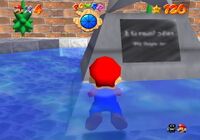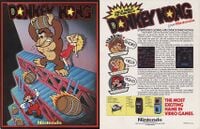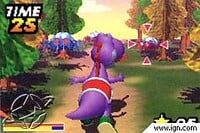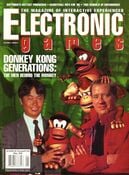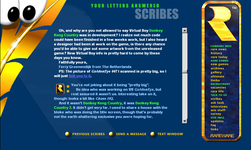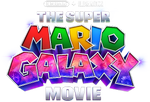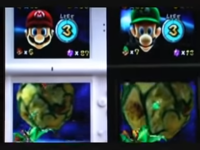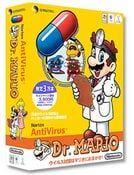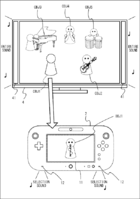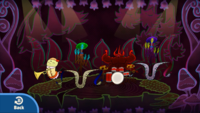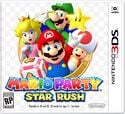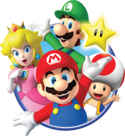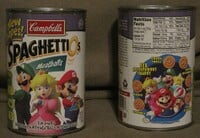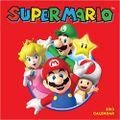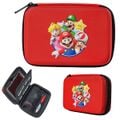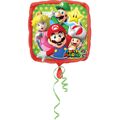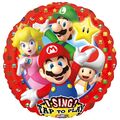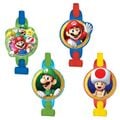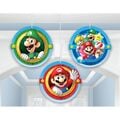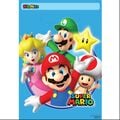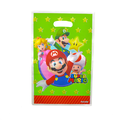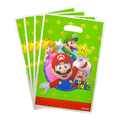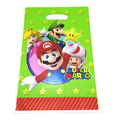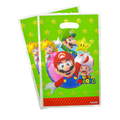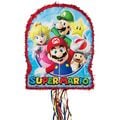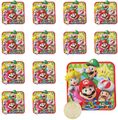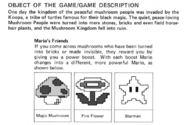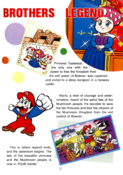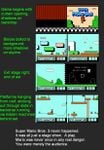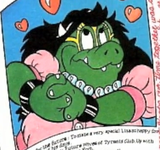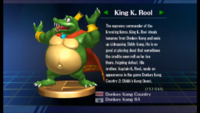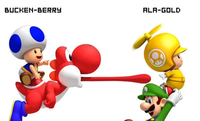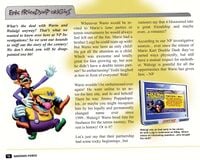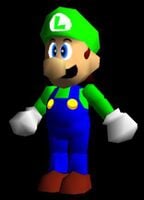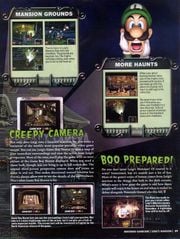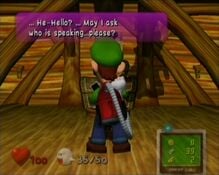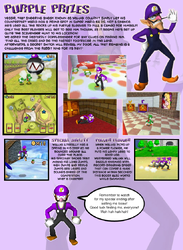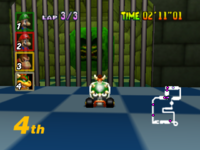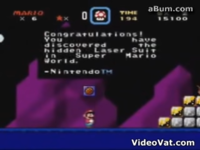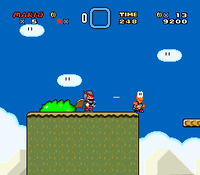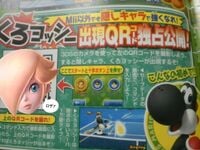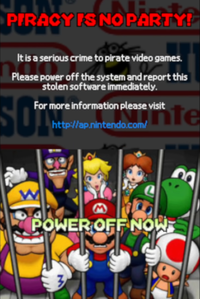List of rumors and urban legends
There have been several rumors, misconceptions, and urban legends regarding production history, fictional details, and gameplay elements within the Super Mario franchise. This article is a list of the history of Super Mario rumors and details the extent to which they are true. Each section is supported by one or more references that detail the spread or debunking of their respective topics.
While the origins of some rumors remain a mystery, others stem from unsourced edits on articles on sources such as Wikipedia or the Super Mario Wiki, misinterpretation of legitimate information, fan works being seen out of context, jokes and speculation being taken as fact, and miscommunication between Nintendo and its marketing departments and licensees.
Production
Donkey Kong's name origin
The origin of Donkey Kong's name has been the subject of several conflicting explanations over time. One popular myth states that the original Donkey Kong game was intended to be titled "Monkey Kong", and was actually named "Donkey Kong" due to either a mistranslation[1] or typo.[2] However, the words monkey and donkey are completely different from each other in Japanese, so it is unlikely to be a translation error. Additionally, while typos resulting in popular names do exist, the accuracy of the latter claim is questionable considering the conflicting viewpoints surrounding it.
Another explanation states that donkey was used to avoid copyright issues with the character King Kong. The etymology of the word "donkey" can be traced back to the word ass, which can also mean fool, with the word fool traditionally being the opposite of the word king. This may suggest that the name "Donkey Kong" was intended as a subversion of "King Kong", and a way to refer to the movie and character without violating copyright law. However, Nintendo was sued by Universal Pictures in 1982 for the exact reason that Donkey Kong was too similar to King Kong. Notably, a written statement produced in 1983 regarding this lawsuit states that Nintendo employee Shinichi Todori came up with the name "Donkey Kong" towards the end of May 1981.[3]
Shigeru Miyamoto, the creator of Donkey Kong, has claimed multiple times that he found the name from a Japanese-English dictionary when looking for something "stubborn" or "stupid".[4][5] Another variation of the story claims that "donkey" was popular Japanese slang for "crazy" in the 80's.[6] While "donkey" is not usually considered to be an adjective or a synonym of those terms, the animals themselves are often associated with stubborn traits. In an interview published in 2016, Miyamoto stated that he was informed by Nintendo of America staff that "donkey" does not mean "stupid" as the dictionary said, but that he ignored their feedback, as he liked the sound of the name "Donkey Kong".[7]
Usage of the name "Jumpman"
Due to Mario initially being referred to as "Jumpman" in the non-Japanese arcade version of Donkey Kong, it is sometimes believed that he was not given the name of "Mario" until the release of Donkey Kong Jr., the game produced immediately after Donkey Kong. This theory is supported by the name "Jumpman" being common throughout English material related to the game, appearing in its operation manual[8] and several graphics containing instructions for play, including a page, card, and banner.
While no Japanese material included the name "Mario" until Donkey Kong Jr. as the theory states, a flyer with story information was released to arcades internationally, in which the protagonist was referred to as "little Mario" in its English localization, proving that he was known as "Mario" to the public before games other than Donkey Kong had released. All subsequent ports of Donkey Kong to home consoles removed the name "Jumpman" in favor of "Mario", with the exception of Arcade Archives: Donkey Kong on the Nintendo Switch.
Inspiration for the Super Mushroom
Some rumors have questioned the origin of the Super Mushroom, suggesting that it was inspired by real-world drugs such as the magic mushroom[9][10] or Amanita muscaria.[11] While the spores of the latter species look similar to the Super Mushroom and other items such as the 1-Up Mushroom, no evidence has confirmed that this was an intentional design decision.
On June 19, 2015, the nonprofit organization NPR published an interview with Shigeru Miyamoto, the creator of Mario, in which he mentioned the story Alice in Wonderland in relation to the origin of mushrooms in Super Mario games.[12] However, in an earlier Iwata Asks interview, he stated that there was no influence from Alice in Wonderland, simply citing "a relationship between mushrooms and magical realms".[13] This more generic explanation also appears in an interview from October 2010 in the magazine Famitsu, in which Miyamoto describes that "you see people in folk tales wandering into forests and eating mushrooms all the time".[14]
An article on the website for the newspaper The Guardian contains an unsourced claim that Miyamoto drew inspiration from "enchanted foodstuffs in myths and folklore" to create the Super Mushroom.[15]
Gunpei Yokoi being the creator of Wario and Daisy
Due to being the most notable member of Nintendo's former Research & Development 1 department and having a role as producer for many of their games, Gunpei Yokoi is often attributed as the sole creator of its franchises and characters up to his departure. This has led fans to credit Yokoi for the creation of the characters Princess Daisy and Wario, two main characters of R&D1's Super Mario Land games.[16][17][18] In reality, Yokoi has never been credited as a character designer in any of the games he was involved with, and no report done during Yokoi's lifetime or modern interviews with former R&D1 staff stated he created any characters for its games.
While no specific creator has been attributed to Princess Daisy, Satoru Okada, the director of Super Mario Land, would be a more likely candidate, as well as Hirofumi Matsuoka or Masahiko Mashimo, graphic designers for the game. Hiroji Kiyotake, director and graphic designer for Super Mario Land 2: 6 Golden Coins, is the creator of Wario, as stated by multiple interviewees in a 2004 interview in the magazine Nintendo DREAM;[19] he is also credited as the original designer of Wario throughout the WarioWare series.
Purple Yoshi Game Boy Advance tech demo
On August 11, 2000, IGNpocket posted a news article promoting the at-the-time new IGN message boards. This article notes an exclusive screenshot is being hosted on their "Handheld Boards", which was provided by a Japanese correspondent.[20] The high quality image appears to be a Game Boy Advance game featuring a Purple Yoshi in gameplay that appears similar to Yoshi's Safari. No game matching the image's description ever released, nor has any information about a Game Boy Advance tech demo featuring Purple Yoshi surfaced.
The initial IGNpocket article is skeptical of the screenshot, noting that it may be a mock-up of what a Game Boy Advance game could be. Modern sources also believe the image is possibly a mock-up or hoax.[21][22]
Shigeru Miyamoto's opinions on Donkey Kong Country
In 2001, author Steven Kent published the book The Ultimate History of Video Games, in which he discussed the development of Super Mario World 2: Yoshi's Island. On page 518, the book details that Shigeru Miyamoto, the creator of Donkey Kong, became frustrated after the original graphical style of Yoshi's Island was rejected for having "not enough punch" compared to the pre-rendered graphics of Donkey Kong Country. Alluding to an interview he conducted with Miyamoto and Tim Stamper, the director of Donkey Kong Country, Kent stated that "Miyamoto was a bit hard on Stamper", and included a quote from Miyamoto saying "Donkey Kong Country proves that players will put up with mediocre gameplay as long as the art is good".[23] This created the rumor that Miyamoto disliked the Donkey Kong Country series.
The interview in question originates from the May 1995 issue of the magazine Electronic Games. However, according to Frank Cifaldi, founder of the Video Game History Foundation, the supposed quote from Miyamoto is not present in the magazine.[24] This led to doubts as to whether Miyamoto said it at all, or if it was merely a false memory from Kent.[25] Of note is that the alleged quote is extremely similar to a line from Cranky Kong in the manual for Donkey Kong Land.
Following the announcement of Donkey Kong Country Returns at E3 2010, the gaming website IGN conducted an interview with Miyamoto in which he alluded to the rumor and declared it to be false, saying, "And apparently recently some rumor got out that I didn't really like that game? I just want to clarify that that's not the case, because I was very involved in [the game's production]."[26]
Donkey Kong Country 2 for the Virtual Boy
On August 10, 2001, in response to a letter sent to Rare's Scribes website about a Donkey Kong Country game on the Virtual Boy, Rare employee Leigh Loveday stated that a Virtual Boy port of Donkey Kong Country 2: Diddy's Kong Quest had been in development, but that it "didn't get very far".[27]
However, an article on the DK Vine fan website showcased that subsequent statements were made by former Rare artist Steven Hurst and, more notably, engineer Paul Machacek, employees who worked on the project. They clarified that there were no concrete plans for any Donkey Kong Country game on the system, and that what Loveday referred to was a short demo to test the capabilities of the Virtual Boy, which consisted of a short stretch of land featuring reused Donkey Kong Land and Battletoads graphics. No evidence suggests this demo was ever planned to become a full game, and DK Vine assumed that it was ultimately scrapped after it became clear that the Virtual Boy was a commercial failure.[28]
Super Mario FX
A rumor suggests that a 3D platformer named Super Mario FX was in development during the lifetime of the SNES, which would have used the Super FX chip to display 3D graphics. Variants of this rumor claim that the game became, or was otherwise the inspiration for, Super Mario 64.
An article on the fan site SNES Central by Evan G elaborates that there is no proof that such a game was in development.[29] Early claims regarding the topic surfaced on video game forum websites, such as the Lost Levels forum in 2004.[30] These theories were supported by a feature on the gaming website IGN in 2007 claiming that "Miyamoto spent years trying to build a fully 3D Mario platformer for the SNES before he finally admitted the technology just wasn't there for him".[31] While IGN did not list a source, the Wikipedia page for Super Mario 64 at the time had referenced an interview with Miyamoto in the January 1996 issue of Nintendo Power, which IGN may have misconstrued. Miyamoto stated that "I first had the idea to do a 3-D Mario game when I was working on Star Fox. That was five years ago".[32] As Star Fox released on the SNES and used the Super FX chip to display full 3D graphics, this may have led to the conclusion that Miyamoto was referring to a 3D Super Mario title using the same hardware, even though he never specified that the idea was for any console in the interview. Additionally, this interpretation would suggest that Miyamoto was developing a title for the SNES years after the Nintendo 64 hardware had begun development, as 'Project Reality', the codename for the console, was announced in August 1993, only about half a year after Star Fox was released.
In their article, Evan G details that they contacted Dylan Cuthbert, the designer of the Super FX chip and lead programmer of Star Fox, who confirmed that no 3D Super Mario platformer was in development for the SNES, and that "Super Mario FX" was actually a codename for the chip itself.[33]
Peeka and Lahla in the Japanese version of Paper Mario: The Thousand-Year Door
In Paper Mario: The Thousand-Year Door, there is a regional difference involving the Boo sisters Peeka and Lahla. In the Japanese release, they both wear a headband with fake bunny ears resembling the Playboy Bunny, the icon of the adult magazine Playboy, but international releases replace the bunny ears with cat ears. This change was likely made either to avoid a reference to adult headgear or out of legal concern, as the Playboy Bunny is a copyrighted icon. The game's Nintendo Switch remake has them wear cat ears in all regions.
Many wikis, such as The Cutting Room Floor and the Super Mario Wiki, originally listed that only Peeka underwent this change, giving the incorrect implication by omission that Lahla has cat ears in the original Japanese version. This was potentially due to Lahla not being a mandatory character to see to complete the game, meaning that Lahla wearing bunny ears may have gone unnoticed for an extended period of time. In reality, both sisters wear identical accessories in all versions, and several wiki pages were edited to reflect this once it was discovered.[34]
Yoshiaki Koizumi and Donkey Kong Country
In February 2005, Donkey Kong Jungle Beat producer Takao Shimizu and co-director Yoshiaki Koizumi conducted an interview with the official Nintendo Online Magazine in Japan regarding the game.[35] An English translation of the interview was produced by the fan website N-Sider, and was shared by the gaming website IGN as part of a partnership between the two websites. One of the questions in the interview was about the game characters, and the English translation stated Koizumi's answer as "All the characters outside of Donkey Kong and the banana are completely original. We don't really feel the past look of Donkey Kong was fresh enough for today. We really gave our new development team the chance to really create something unique and stylish."[36] Due to its dismissive implications, this statement was the subject of substantial negative backlash from Donkey Kong fans.
As recorded on the DK Vine fan website, a post by the Super Mario Wiki Twitter account in April 2019 prompted DK Vine informant Johnnie Kong to translate the text themselves.[37] In doing so, he uncovered a more accurate interpretation of Koizumi's statement: Koizumi chose to use a mostly original cast because the tone of the game was very "uncharacteristic" compared to that of previous Donkey Kong titles; he also hoped Jungle Beat would represent the "personality" of the newly-formed EAD Tokyo team.[38] The gaming news website Source Gaming would verify this interpretation by sharing their own translation on Twitter shortly after this.[39]
Notably, N-Sider translations of Japanese material have been found to contain mistranslations and forgery.[40]
French title of the Donkey Kong Country television series
The earliest accessible edit to the Wikipedia page for the 1996 Donkey Kong Country television series states that the original French version was titled La Planète de Donkey Kong (translated as "Planet Donkey Kong").[41] In May 2010, the text was edited to say "Created by France 2 and Nelvana, it was originally titled 'La Planète de Donkey Kong' ('The Planet of Donkey Kong' in English translation)."[42] This sentence, and the introductory paragraph it came from, would be copied verbatim across multiple summaries of the TV series on different English databases.[43][44] The mistake was also cited as fact on an edit made to the series' page on the Donkey Kong Wiki fan site.[45]
"La Planète de Donkey Kong" actually refers to a programming block (later renamed to "DKTV") which aired from 1996 to 2001 exclusively in France, and hosted the Donkey Kong Country series alongside a large number of other children's programs. As with other regions, the Donkey Kong Country cartoon itself was named "Donkey Kong Country" when it aired in France and Québec, with some ads and TV listings shortening the title to simply "Donkey Kong".[46]
On September 16, 2007, shortly before the release of Super Mario Galaxy, a post about the game's logo art was made to the forum site NeoGAF.[47] It noted that some letters of the logo contained a small twinkle; if these letters are singled out and read together, the result is "UR MR GAY" (You are Mr. Gay). This led some to suggest that the twinkles may be a hidden message created by the logo artist.[48]
In Super Mario Galaxy 2, these sparkles are still present in the game's logo, but have been rearranged. They now spell out "UR MI AY", although this can be interpreted as "YA, I M, R U?" (Yeah, I am, are you?) if read backwards.[49] The preliminary logo of Super Mario Odyssey contains similar sparkles, which spell out "MARIO DYS" (interpreted by some as "Mario dies").[50] In the logo for The Super Mario Galaxy Movie, the sparkles have been rearranged again, resulting in the spelling "HE MR GY" (He is Mr. Gay).[51]
It is most likely that all four logos simply arrange the twinkles to be aesthetically pleasing, with any "messages" being entirely unintentional.
Super Mario Galaxy DS
On December 9, 2007, a video showcasing a downloadable, Nintendo DS version of Super Mario Galaxy was uploaded to YouTube.[52] The footage showed a hidden galaxy unlocked by collecting all 121 Power Stars as both Mario and Luigi and feeding them all to a Hungry Luma, which would allow the player to access the Nintendo DS version of the game using the Download Play feature. The player used the stylus to control Mario, and both brothers were shown in the game's galaxies simultaneously, implying a co-op mode. The video also stated that each Power Star collected in the Nintendo DS version would be redeemable for 10 Wii Points on the Wii Shop Channel.
About ten days after the video's release, an article on Engadget proved the footage to be fabricated by discovering a shorter but cleaner version of the same video on the video site Stage6. The video was posted by psycho3ler, the username of Pablo Belmonte, who had previously created a hoax video of a "Nintendo ON" console in 2005 (the original Super Mario Galaxy DS video even showed a Nintendo ON planet, adding credibility to this theory).[53] Belmonte himself would later upload a high-quality version of the video, explaining in the description that it was created for a school project involving designing a viral video.[54]
Norton AntiVirus: Dr. Mario
In 2008, Symantec Corporation announced a new version of their Norton AntiVirus software. Subtitled the "Gaming Edition", it used less computer resources to make it easier to play video games while the antivirus was running. However, when an article about the software was published to gaming site Kotaku on November 11, 2008, it was accompanied by a picture of a different software, labeled Norton AntiVirus: Dr. Mario.[55] No text in the article mentioned or alluded to Dr. Mario nor this image.
Other news websites would later republish the image;[56] some mistakenly stated that the software was directly related to Dr. Mario, likely due to them interpreting the image as the official art created for the software.[57] While the Gaming Edition version of Norton AntiVirus was officially published, it did not contain any connection to Nintendo nor the Super Mario franchise.
The original source of the image remains unknown. Due to the lack of evidence, it is most likely that the art was fabricated using image-editing software and presented to Kotaku as a genuine product, leading it to be spread and believed as such by other news outlets and their readers.
Larry Koopa's namesake
On April 30, 2010, the Official Nintendo Magazine in Great Britain published an article to their website stating the name origins of the Koopalings, with Larry Koopa said to be named after the talk show host Larry King.[58] This was contested by former Nintendo of America employee Dayvv Brooks, who named all of the Koopalings during the production of Super Mario Bros. 3. According to Brooks, Larry is named after a musician like his siblings, in this case the inspiration being Larry Mullen, Jr., the drummer for the rock band U2.[59]
However, on December 29, 2015, the gaming site Kotaku published an interview with Brooks contradicting his previous statement. Brooks asserted that all of the Koopalings were named after real-world figures except Larry, stating that "there’s no real-world equivalent—he’s not Larry Mullen Jr. from U2 or Larry King—he just looked like a Larry."[60]
Yoichi Kotabe's involvement in Super Mario 3D Land
On August 10, 2012, an edit was made to the Wikipedia page for the long-time Super Mario artist Yoichi Kotabe stating that his latest work was for Super Mario 3D Land as an illustrator.[61] This claim may have inspired an unsourced edit to the same page on the Super Mario Wiki on September 7, 2012 stating that Kotabe had returned from retirement to draw the artwork for Princess Peach's letters in that game.[62] While both claims were eventually removed, other websites cited the error as fact.[63][64]
While the art style of the letters is similar to Kotabe's Super Mario artwork, his name is not listed in the staff credits for Super Mario 3D Land, nor is he mentioned in the two Iwata Asks interviews dedicated to the game.[65][66] The artwork was actually drawn by current Super Mario artist Shigehisa Nakaue, who does appear in the credits of the game and was credited under "Illustrations" for it by the January 2012 issue of the Japanese magazine Nintendo DREAM. Nakaue also appears in the in-game credits of Super Mario 3D World, Mario Kart 8, and Mario Party: Star Rush.
Donkey Kong 64 only requiring the Expansion Pak to fix a memory leak
On May 28, 2013, former Rare employee Chris Marlow published a Let's Play video of Conker's Bad Fur Day in which he shared an anecdote revealing that Donkey Kong 64 was allegedly not initially planned to support the Expansion Pak RAM expansion. Marlow explained that Rare found a memory leak to occur after a short amount of playtime and, as they were unable to pinpoint the exact cause of the issue before release, were forced to bundle the Expansion Pak with the game as a quick fix.[67] The story was immediately picked up by video game news websites,[68] and was presented as fact on the Super Mario Wiki page for Donkey Kong 64.[69]
Mark Stevenson, a developer of Donkey Kong 64, would deny this claim in a November 2019 interview, stating that Rare's management instructed the game's developers to support the Expansion Pak early in development to accommodate advanced graphical effects[70] (dynamic lighting was specifically cited as a feature that made use of the Expansion Pak in another interview with Stevenson[71]). He added that while Donkey Kong 64 did contain a game-breaking bug during development, it only affected one revision of the Nintendo 64 hardware, and was eventually resolved. Stevenson speculated that these two stories were likely conflated into one, creating the memory leak rumor.[70]
"Wii Music U" patent
On May 22, 2014, the United States Patent and Trademark Office approved a patent application filed by Nintendo describing a music-based game using the Wii U GamePad.[72] The user Rösti created a thread on the video game forum NeoGAF about the patent, speculating that it was related to a sequel or follow-up to the Wii game Wii Music.[73] In response to this thread, video game news websites ran articles stating that a sequel to Wii Music was rumored to be in development.[74]
In reality, the patent did not pertain to a sequel to Wii Music or any other standalone game, but instead a small feature in Game & Wario. The Cluck-A-Pop mode features a series of prizes in toy capsules labeled with the name Bugband, and each one is a sound test where each layer of a song is represented by characters which the player can isolate, remove or interact with from the Wii U GamePad screen. This matches the description and images found on the patent.
Another indicator that the patent was for Game & Wario is that the inventors listed are Goro Abe and Takehiko Hosokawa, the director and assistant director of the game, respectively. Both worked for Nintendo SPD rather than Nintendo EAD, the developer of Wii Music, and neither had any involvement in Wii Music. Goro Abe is also listed as the inventor on several other patents filed around this time, all of which clearly describe aspects of Game & Wario: one patent application is for the Pirates minigame,[75] another describes Disco,[76] and a third depicts Bowling.[77]
Origin of the Super Mario Bros. ROM file for Wii Virtual Console
In March 2016, Frank Cifaldi presented a talk at GDC 2016 discussing the challenges of distributing older video games. During the talk, he showcased two ROM files of Super Mario Bros. from different sources. One was downloaded from a ROM site while the other was from the Wii Virtual Console. Frank highlights the iNES header present in both ROM files and explains that iNES is a header format that originates from unofficial software emulation in the late 1990s.[78] On January 19, 2017, Eurogamer published an article claiming that Nintendo downloaded a ROM file of Super Mario Bros. from the internet and sold it back on the Wii Virtual Console.[79][80]
While Nintendo does use the iNES header format, it is not because Nintendo downloaded ROM files from the Internet. Sometime in the late 1990s, Nintendo hired Japanese developer Tomohiro Kawase, who was a contributor to iNES. Along with the help of Hideaki Shimizu, they would both develop an official Famicom/NES emulator for the Nintendo 64, which used ROM files that contained iNES headers. The use of iNES headers would carry over to future emulators developed by Nintendo, used in Virtual Console and Nintendo Classics - Nintendo Switch Online.[81]
Mario Party: Star Rush cover artwork
In June 2016, shortly after Mario Party: Star Rush was announced during E3 2016, a post on Twitter was made joking about Nintendo reusing art from cans of Campbell's Spaghetti-Os. The tentative cover art of the game appeared to be based off of artwork used on cans from a Super Mario promotion between Campbell's and Nintendo.[82] This post quickly gained popularity and was shared by several popular gaming websites,[83][84][85][86][87] giving off the impression that the artwork was directly taken from the can.
However, the original artwork used on the can is simply stock promotional artwork. Before the announcement of Nintendo's collaboration with Campbell's in late November 2013,[88] the art had made many prior appearances. It was used on a standee[89] and banner images used on gaming news websites[90][91] advertising "The Nintendo Experience", an event where customers could access playable demo versions of Wii U games, including Mario Kart 8 and Super Mario 3D World, at select Best Buy locations on June 12 and June 15 of 2013.[92] It was then used for a small advertisement image on the Wii U website[93] and the webpage the image linked to[94] promoting a similar "Nintendo Experience Tour" event held at Simon Mall locations from August 31 to November 3 of 2013. Other uses of the art include the official Super Mario Brothers 2013 Wall Calendar, which was released on August 1, 2012;[95] a Facebook application designed for use during E3 2013;[96] a generic banner image besides the Nintendo logo used as press material in news stories since 2015;[97][98][99][100] a set of three Nintendo eShop gift cards;[101] on the North American,[102] British,[103] and Italian[104] varations of Nintendo's child-oriented websites, including Play Nintendo and Nintendo Kids Club; and under a "Shop By Character" section of the home page of the Nintendo Online Store.[105]
Additionally, the original stock art has been featured on products that have continued to be sold after the soup cans and Mario Party: Star Rush, such as a travel case for the Nintendo DS family of systems,[106][107] a "Step Into Reading" children's book by the publisher Penguin Random House,[108] Super Mario fruit snacks by Kellogg's,[109] file folders[110][111] and a special trading card[112] sold by Yamada Denki, various wholesale party favors and decorations,[113][114][115][116][117][118][119][120] and a birthday email sent by Nintendo.
The placeholder stock art would be replaced with an original scene for the game's final box art.
Gallery of stock art appearances
Super Mario: Meet Mario! children's book cover
Valentine's Day cards
The Super Mario Bros. Movie Jeannie Elias cameo
A commercial for The Super Mario Bros. Movie, released on February 12, 2023, features a woman advertising for Super Mario Bros. Plumbing; this scene, including the woman's line, would later appear identically in the film. Some sources claimed the woman to be voiced by Jeannie Elias, the voice actress of Princess Toadstool in The Super Mario Bros. Super Show!, with speculation arising that this was part of a homage to The Super Mario Bros. Super Show! along with the scene's usage of the "Mario Brothers Rap". The earliest known source of the rumor is a Twitter post from the day the commercial was released.[121] This was reported on by multiple news outlets.[122][123][124] However, neither Elias nor any person or organization involved in the film's creation have corroborated the statement.
In a Twitter post on April 19, 2023, actress Jessica DiCicco confirmed that she voiced the woman.[125] Despite this, the character is not listed in the film's credits.
Fiction
The breakable bricks in Super Mario Bros. are transformed Toads
The "Game Description" section on page 2 of the instruction manual for the original Super Mario Bros. states that the "Mushroom People" of the Mushroom Kingdom were "turned into mere stones, bricks and even field horse-hair plants".[126] The mention of "bricks" led many to assume that the Brick Blocks that Mario can break throughout the game were transformed Toads, supporting the idea that Mario is "murdering" the Toads by breaking these blocks.[127] However, page 8 of the same manual states that "mushrooms who have been turned into bricks" will "reward you by giving you a power boost" upon finding them, implying that the blocks that were transformed Toads were specifically the Brick Blocks, ? Blocks, and Hidden Blocks that produce power-ups upon being hit, which cannot be destroyed.[126]
Despite Mario being able to break these blocks in later games, such as by using the Mega Mushroom in New Super Mario Bros., no other game besides Super Mario Bros. has Bowser transform Toads. However, in single-player New Super Mario Bros. Wii, Toads are trapped in blocks that, when hit by Mario, free the Toads.
Princess Toadstool was intended to be a Toad in early production of Super Mario Bros.
In 1985, after the release of Super Mario Bros., a strategy guide for the game titled How to win at Super Mario Bros. contains an illustration of Princess Toadstool designed similarly to her subjects, leading to the impression that Toadstool was intended to be a Toad at some point during the development of the game, as the illustration was mistaken for concept artwork.[128]
After Peachette was revealed in a Nintendo Direct presentation in September 2018, gaming news websites used the image in their discussions and analysis of the character, theorizing that the artwork hinted at a connection between Toadstool and Toadette.[129][130][131]
These illustrations were drawn by the manga artist Daisuke Shigoto, who created them for a manga based on Super Mario Bros. that appeared in the November 1985 issue of Family Computer Magazine.[132] In the original 1985 Japanese release of How to win at Super Mario Bros., known as Super Mario Bros. Kanzen Kōryakubon, the illustration of Princess Toadstool is identical to its appearance in the Family Computer Magazine manga. When How to win at Super Mario Bros. was published in the United States in early 1987, the illustrations drawn by Shigoto were simply retouched and reused, due to the entire guide having an identical structure to the Japanese version.
The earliest release date of Super Mario Bros. was for the Family Computer on September 13, 1985, which means that the game was released at least one month before the Family Computer Magazine manga was published. As detailed information about the game was scarcely known at this time, it is likely that Shigoto created the illustration of Princess Toadstool for the manga based on vague descriptions of the game's story, rather than using reference artwork of the character. However, because these illustrations were produced after the game released with no involvement of people from Nintendo Entertainment Analysis and Development, they have no impact on the development history of Super Mario Bros.
Mario and Luigi's last name
With the introduction of Luigi as Mario's brother, the pair began to be collectively referred to as "the Mario brothers", which has led many to believe that Mario and Luigi's last names are actually "Mario". This theory was supported by The Super Mario Bros. Super Show! live-action episodes "Dance", "Home Radio", and "Treasure of the Sierra Brooklyn", and, more famously, the 1993 Super Mario Bros. live-action film, all of which used "Mario" as the brothers' surname. Several other sources, such as the Mario Party 2 Prima Games guide and a promotional flyer for the Donkey Kong, Donkey Kong Junior, Mario Bros. arcade cabinet, also use the "Mario" last name. Charles Martinet, Mario's previous voice actor, has given it as his response in Mario in Real Time when asked about Mario's last name.[133]
Various Nintendo employees and representatives, including series creator Shigeru Miyamoto, have stated that Mario and Luigi do not have a last name at all.[134][135][136] However, Miyamoto later seemingly retracted this stance, stating during the Super Mario Bros. 30th Anniversary festival held in Shibuya that Mario's full name is "Mario Mario".[137]
Super Mario Bros. 3 is a stage play
Several design elements in Super Mario Bros. 3 suggest that the events of the game are a stage play rather than a real adventure. These include the rising and closing curtains at the beginning of the game, the end of each stage being a black void representing an exit stage, several platforms being visibly suspended by cables and some being bolted into the background and casting shadows onto the sky.[138] On September 10, 2015, Shigeru Miyamoto, the creator of Mario, would claim that the theory is true in a YouTube video discussing various Super Mario rumors and myths.[139] However, this does not appear to be true of the Super Mario All-Stars and Super Mario Advance 4: Super Mario Bros. 3 versions of the game, due to their more realistic backgrounds, the removal of platform shadows, and the latter containing an introductory cutscene rather than curtains opening.
Clawdia Koopa
A popular rumor states that an issue of a Nintendo magazine in the United Kingdom said that Bowser had a wife named "Clawdia Koopa".[140][141][142][143] However, despite the popularity of this claim, no scan or direct quotation of the statement has surfaced. Additionally, most websites that make this claim attribute it to "Nintendo Power UK", a publication that does not exist (the official Nintendo magazine of the UK went through a variety of names, but none related to Nintendo Power).
Many of these sources also show an image of a female Koopa as proof of Clawdia's existence. However, the image is actually of a Nintendo Comics System single-panel comic named Koopa's High School Yearbook, in which the character is an unnamed character in Koopa's yearbook and her relationship status with Koopa is not stated outside of her being implied to have a crush on him.
The idea that Bowser has a wife named Clawdia Koopa likely originates from the Super Mario fan website Lemmy's Land. The user "Lemmy Koopa", the owner of the website, created an original character named Clawdia to play the role of Bowser's wife in his fanfiction. She appeared on the site as early as 2002.[144] As Lemmy Koopa has always been open about Clawdia being his original character, it is most likely that a third party started the "Nintendo Power UK" rumor.
King K. Rool's costumes are separate characters in Japanese material
The trophy description for King K. Rool in Super Smash Bros. Brawl states that "His brother, Kaptain K. Rool, made an appearance in the game Donkey Kong Country 2: Diddy's Kong Quest". While Donkey Kong Country 2: Diddy's Kong Quest was developed by Rareware in Twycross, England and subsequently localized to other regions, the inclusion of the term "brother" in Super Smash Bros. Brawl, a game developed in Japan and localized into English, led to fans speculating that Kaptain K. Rool being a separate character was a change made during Japanese localization of the Donkey Kong Country games. As this theory was shared, it may have been subject to a broken telephone effect, becoming the "fact" that Japanese material treats King K. Rool's disguises as separate characters.[145] In truth, Japanese material for the Donkey Kong Country series also portrays K. Rool's aliases as being mere disguises.[146][better source needed] Therefore, the trophy description is merely an error. On September 20, 2013, Rare's official Twitter account would make a post affirming this, citing a developer stating that "It's the same character in different clothes".[147]
The Donkey Kong Country animated series featured Kaptain Skurvy, a pirate-themed character who uses the same model as General Klump with different textures, and who is eventually revealed to be Klump's long-lost brother. As the Donkey Kong Country series was relatively popular in Japan, the developers of Super Smash Bros. Brawl may have conflated this relationship with the one between King K. Rool and Kaptain K. Rool.
Bucken-Berry and Ala-Gold
On November 16, 2009, an article by Jonathan Holmes was uploaded to gaming news website Destructoid. In the article, Holmes describes an event at Nintendo New York to celebrate the launch day of New Super Mario Bros. Wii. Claiming the video footage of the event was destroyed, he instead describes his experience. Towards the end of the article, he claims to have started a conversation with a "Nintendo rep" about the names of Yellow Toad and Blue Toad:
Somehow we got on the topic of the new playable Toads in NSMB Wii, and how I wondered if they ever had names. He said that from what he’d been told, they did have nicknames amongst the NSMB Wii development team, but that they weren’t official. I retorted that from what I’d been told, Mario was originally called Jumpman, and that the Mario name was at first just a nickname based on the character’s resemblance to a janitor that worked at Nintendo. This meant that in the Mario-verse, nicknames can lead to big things.
Of course, I asked what the nicknames were. He told me to turn the camera off. Then, with an extremely serious face, he whispered in my ear, “The yellow one is called Ala-Gold, and the blue one is named Bucken-Berry.”
Now, I don’t know if this guy knows what he’s talking about or not, but I don’t care. From now on, the yellow Toad is Ala-Gold, and the blue Toad is Bucken-Berry. Case closed.[148]
There is no other evidence to suggest that these are official or development names for Blue Toad and Yellow Toad. As there is no other documentation of Holmes' experience at the event, there is not enough evidence to support the veracity of this conversation. Additionally, the name "Ala-Gold" appears to be derived from "Allah Gold", the name given to Anakin Skywalker in notoriously poor recursively translated English subtitles from an unofficial Chinese translation of Star Wars: Episode III – Revenge of the Sith titled "Star War the Third Gathers: The Backstroke of the West".[149]
The Koopalings being Bowser's children is a Western addition
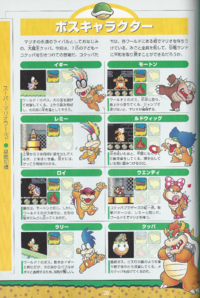
After the release of New Super Mario Bros. Wii in 2009, its Japanese website stated that the Koopalings are minions of Bowser rather than his children.[150] Additionally, a Game Informer interview with Shigeru Miyamoto, the creator of Mario, in October 2012 had Miyamoto state that "Our current story is that the seven Koopalings are not Bowser's children. Bowser's only child is Bowser Jr., and we do not know who the mother is."[136] These sources were used to support the claim that the Koopalings being Bowser's children in previous Super Mario games was a change made for their English localizations.[151]
On December 29, 2015, an interview on the gaming site Kotaku with former Nintendo of America employee Dayvv Brooks revealed information about the production of Super Mario Bros. 3, the first appearance of the Koopalings. Brooks changed their dialogue in its manual and gave the originally unnamed characters their names,[60] which have been used in the original Japanese versions of Super Mario games ever since.[152]
However, these changes were the only ones made to the Koopalings in localization. The fact that they were once considered Bowser's children in Japanese media is evident in:
- The Japanese manual for Super Mario Bros. 3. On page 4, the Koopalings are called "Bowser's own children, the 7 Koopaling siblings" (「
自分 の子供 コクッパ7兄弟 」). Bowser's line on page 2 reads 「ワッハハ。これから俺様 の息子達 がこのゲームの説明 をするぜ。息子達 の言 うことをよーく聞 いてせいぜいガンバルことだな。ワッハハ。」: the use of「俺様 の息子達 」(ore-sama no musuko-tachi) equates to "my children" (or literally, "my sons"). Larry's line on page 4, Morton's on page 8, and Lemmy's on page 34 refer to King Koopa as「オヤジ」(oyaji), which is both a word for "father" and a term of endearment. - Super Mario All Encylopedia (or「スーパーマリオ
全百科 」), a book written in cooperation with Nintendo and released during the 1990s. In both the Super Mario World section and the Super Mario Bros. 3 section, the Koopalings are considered part of the "Royal Family" (「王 族 」); this is further confirmed on page 89, where both Bowser and the Koopalings are stated to be part of it. On page 151, the Koopalings are explicitly stated to be Bowser's children (「クッパの子 ども、コクッパたち」). On page 228, Bowser is referred to as the "demon/sorcerer king" (「大魔王 」), and on page 214, Larry Koopa is stated to be the "youngest child of the demon/sorcerer king" (「大魔王 の末 っ子 」). On the same page, the Koopalings are also stated to be siblings (「コクッパ7兄弟 」). - The Japanese description for Bowser's main trophy in Super Smash Bros. Melee, which refers to him as having "7 children" (「7人のこども」).
- The Nintendo Official Guidebook for Super Mario World: Super Mario Advance 2. Page 20 roughly states that the Koopalings are "[Bowser's] 7 children" (「7
匹 の子ども=コクッパ」) using an implied possessive pronoun. - The Nintendo Official Guidebook for Super Mario Advance 4: Super Mario Bros. 3. Page 4 refers to the Koopalings as "[Bowser's] own children" (「
自分 の子 どもの「コクッパ7兄弟 」」), with an implied possessive similarly to Super Mario World: Super Mario Advance 2. Notably, Super Mario Advance 4 and its guide were released after the introduction of Bowser Jr. in Super Mario Sunshine, showing that the Koopalings were still considered to be additional children of Bowser alongside his son.
Ashley's age
On April 11, 2012, the Super Mario Wiki page for Ashley and Red was edited to include the unsourced claim that Ashley was a "six-year-old in the original japan version" of WarioWare: Touched!, with the same user later changing the "six" to "eight" on the same day.[153] This statement that Ashley was eight years old in the original Japanese versions of WarioWare games remained on the page for over a year before being removed on November 1, 2013.[154] Various sources across the Internet would go on to either repeat the statement as fact or generally question Ashley's age between Japanese WarioWare titles and their English localizations.[155][156][157][158][159]
On the WarioWare: Touched! website, Ashley was stated to be "Fifteen going on 500",[160][better source needed] but its Japanese equivalent does not give a precise age to Ashley. There are signs that Ashley is intended to be a younger child of less than 15 years, such as her voice and the fact she refers to herself in the third person in Japanese material, a speaking pattern that usually denotes young, immature characters in Japanese media. However, she has never been given an exact age in any Japanese WarioWare media; while the Japanese description for the Crazy Galaxy badges in Nintendo Badge Arcade states that "[Ashley] looks like more of an adult", she is not given a reference point for this aging.
The Super Mario characters are actors
In September 2012, Game Informer published an interview with Shigeru Miyamoto and Takashi Tezuka, developers of Super Mario Bros. and many other Super Mario games, in issue 234 of their magazine. It was then reported on by several other websites, with a recurring quotation being that of Shigeru Miyamoto stating that he pictured the recurring Super Mario characters as "[...] a troupe of actors". Many who reported on the interview omitted the context of this statement, with the gaming website Polygon using it as a headline.[161] Other websites then took the quote literally, using it as evidence that the Super Mario characters are actors playing a role and that their adventures are not legitimate in the context of the Super Mario universe. Additional evidence for this included the idea that Super Mario Bros. 3 is a stage play, and the use of the audience in Paper Mario: The Thousand-Year Door.[162]
Analyzing the full statement, however, provides additional key context. When asked by the interviewer why Mario and Princess Peach partake in friendly sporting competitions with Bowser despite their antagonistic relationship in other games, Miyamoto responded that he pictured Super Mario characters as being similar to old comic and cartoon characters such as Popeye, who frequently changed time period and occupation depending on the scenario with no explanation. This shows that the phrase "troupe of actors" was used to highlight the malleability of the characters' roles rather than the legitimacy of their adventures.
Interviewer: Time and again, Bowser kidnaps Peach. Why do Mario and Peach still race go-karts and play tennis with him??
Miyamoto: If you're familiar with things like Popeye and some of the old comic characters, you would oftentimes see this cast of characters that takes on different roles depending on the comic or cartoon. They might be businessman in one [cartoon] or a pirate in another. Depending on the story that was being told, they would change roles. So, to a certain degree, I look at our characters in a similar way and feel that they can take on different roles in different games. It's more like they're one big family, or maybe a troupe of actors.[136]
Toads' genders
On November 17, 2014, the gaming website GameSpot posted an article featuring a segment of an interview with Koichi Hayashida, the producer of Captain Toad: Treasure Tracker. When discussing the genders of Toad and Toadette, Hayashida stated that "'...we never really went out of our way to decide on the sex of these characters, even though they have somewhat gendered appearances.'" This led the article's writer to conclude that "Toads are a genderless race that take on gendered characteristics".[163]
However, a December 2014 interview with Shigeru Miyamoto, the creator of the Super Mario franchise, contradicts this. Using a human translator, Miyamoto described that "we didn't really have in mind whether Toad was a boy or a girl" until Toadette was introduced. This led players to "take the impression that Toad was a boy because Toadette was a girl".[164] This shows that Toads were more likely viewed with an ambiguous gender at first, rather than being genderless as the GameSpot article states.
Waluigi's real name is Jimmy Poppadopolos
On July 20, 2020, a post was made on Twitter claiming Waluigi's birth name to be Jimmy Poppadopolos.[165] The post contained a scan supposedly from the September 2000 issue of Nintendo Power, with the following text:
EpIc fRienDshiP oRIGinS
What's the deal with Wario and Waluigi anyway? That's what we wanted to know over here at NP Investigations! So we sent our hounds to sniff out the story of the century! We don't think you will be disappointed one bit!
Whenever Wario would be invited to Mario's lame parties or tennis tournaments he would always feel left out of the fun. Mario had a brother Luigi he could team up with! But Wario was born an only child! He got all the attention as a child. Which was awesome and totally great for him growing up, but now he didn't have a double tennis partner! So embarrassing! Yoshi laughed at him in front of everyone! Wah!
Wario wouldn't be embarrassed ever again! He went online to an actor-for-hire site, and lo and behold! There he was: Jimmy Poppadopolos...or maybe you might recognize him by his legally and permanently changed name ever since 1999...Waluigi! Wario hired him for freelance for the tennis tourney. The rest is history! Or is it?
Let's just say that their partnership had some rocky beginnings... but rumours say that it blossomed into great friendship and maybe even...a romance?
According to our NP investigative sources... ever since the release of Mario Kart Double Dash[sic] they've parted ways physically, but still have a mutual respect for eachother[sic]. Waluigi is grateful for all the opportunities that Wario has given him. - NP
Despite the text supposedly being written in the year 2000, it mentions the release of Mario Kart: Double Dash!!, which occurred in 2003, and the image features artwork of Wario and Waluigi from the 2005 game Mario Party 7. The real September 2000 issue of Nintendo Power does contain a page that covers Waluigi, but it has different text, instead introducing him and the online game Waluigi's Toenail Clipping Party:
MAMMA MIA! IT'S WALUIGI!
He's lean, he's mean, he hates the color green! Yes, with hopes of finally overthrowing Mario's supreme reign as the video game king, Wario has enlisted the help of Waluigi. The big fellow with a nasty smirk and burning hatred of good, ol' Luigi finally shows his ugly mug in Mario Tennis, and to mark the momentous occasion we're giving the purple one his very own website! You can check out www.waluigi.com for all your evil sidekick needs: photos, secret information, and all the wacky hijinks you could ever desire. We're looking to have online games, too, including the[sic] Waluigi's Toenail Clipping Party. It seems that everyone's favorite mustachioed mischief maker has let his personal grooming go, and it's up to you to help him. Clip those nails good, and be sure to aim for the jar, or you'll be left with ragged clippings and toe jam all over your hard drive. Eewwww![166]
The fabricated image also contains the following image caption: "Waluigi was so bad early in his career, he sold Luigi's underwear on EBay. Which raises an interesting question...who bought the stuff?" The actual caption instead states: "He's so bad, he sold Luigi's underwear on EBay. Which raises an interesting question… who bought the stuff?"
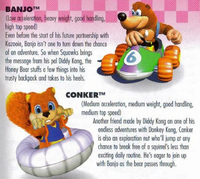
Diddy Kong Racing included the characters of Banjo and Conker, guest characters from the then-upcoming titles Banjo-Kazooie and Twelve Tales: Conker 64, in its playable roster, and referred to them as being established friends of Diddy Kong's within the manual. This led to a consensus among fans that Banjo-Kazooie and the eventually reworked Conker's Bad Fur Day shared a universe with Donkey Kong (and sometimes Super Mario) in what is often referred to as the "Donkey Kong Universe", supported by other instances of crossovers (such as a character named after Gnawty appearing as a friendly NPC in Banjo-Kazooie), and reflected by games in those series receiving coverage in the early years of Super Mario Wiki.[167][168][169] Gregg Mayles, creator of Banjo-Kazooie, and Chris Seavor, voice actor of Conker and project lead of Conker's Bad Fur Day, have both debunked these statements,[170][171] with Mayles elaborating that he really perceived the crossovers in Diddy Kong Racing as involving "travel[ing] between worlds" akin to Marvel comics.
In my head, each game existed in its own world, but characters could travel between worlds to feature in each others[sic] games. A bit like all the heroes and villains in the Marvel universe[172]
Gameplay
Luigi in Super Mario 64 / "L is real 2401"
A famous rumor surrounding Super Mario 64 was that Luigi can be unlocked as a secret playable character, with proponents often citing the Star Fountain in the courtyard of Peach's Castle as proof. The statue features a plaque with small, blurry characters that purportedly read "L is real 2401", which supports the idea that Luigi (the character "L" stands for) exists in the game. However, the inscription has also been interpreted to read "Eternal Star" by many, which is the name of the final board in Mario Party. After the discovery of this plaque, many theories regarding the meaning of the "L is real 2401" message circulated, many being that the number "2401" hinted at the method of unlocking Luigi. These methods, which varied in levels of absurdity, included running 2,401 laps around the courtyard statue or collecting every single coin in the game (there supposedly being 2,401 coins in total).[173] On April 1, 2000, the user Hairball published several fabricated screenshots onto the blog site Super Mario 128 Central with their own explanation, claiming that unlocking Luigi would also unlock a co-op gameplay mode.[174]
On November 13, 1996, after receiving numerous fake explanations and controller input codes from fans, the gaming website IGN offered a $100 reward for an authentic method of unlocking Luigi in the game.[175] A week later, the staff would post an update stating that, while no legitimate methods had been found, the number of false submissions had significantly dropped. They concluded that Luigi's inclusion in the game was simply a myth.[176]
Nintendo itself acknowledged the rumor in an April Fools' Day feature in the April 1998 issue of Nintendo Power, which stated that it would discuss the "L is real 2401" message on the non-existent page 128. During the same year, a fan sent a letter to Nintendo of America asking about the message on the statue. According to Game Play Counselor Michael D. Chandler's response letter, the message has no actual meaning and was only added as a joke to trick players into thinking that it had a hidden meaning.[177]
A variant of the rumor claims that "L is real 2401" instead refers to Paper Mario, a game that Luigi does appear in, though as a non-playable character. According to the rumor, the "2401" refers to the game's supposed North American release date of February 4, 2001,[178][179] even though the actual date was one day later, on February 5. In addition, Paper Mario was initially released in Japan on August 11, 2000, and was originally scheduled for a December 26, 2000 launch in North America before being delayed to February 2001.[180] As the development team of Super Mario 64 could not have predicted the exact release date of any game years in advance, it is highly unlikely that the text was foreshadowing Luigi's appearance in this game.
Post-release interviews about the game would reveal that the developers had initially planned to include a cooperative multiplayer mode featuring Luigi, with early prototypes allowing players to run around in a large space as Mario and Luigi simultaneously, but that this feature had to be cut due to hardware limitations.[181][182] Eventually, Luigi was made a playable character in Super Mario 64 DS, a remake of Super Mario 64. Due to a large-scale asset leak of pre-release Nintendo games, a prototype model of Luigi from pre-release development files of Super Mario 64 was found and assembled on July 25, 2020; the official release of the game does not contain this asset. Coincidentally, this date was 24 years and one month (hence, 24-01) after the game was released;[183] additionally, the numbers that make up the day and month relate as well, with 7 (July) being all four digits added together and 25 being 24 + 01.
Ninja Mario in Super Mario 64
Former Nintendo Power columnist Daniel Owsen would state in a subscriber-exclusive feature of the magazine that one question he was asked many times was how to unlock "Ninja Mario" in Super Mario 64. Despite repeatedly confirming that such a form does not exist, fans continued to ask him about it. After some time, his answers went from tongue-in-cheek responses such as "A ninja never reveals his secrets" and "I'd tell you, but then I'd have to kill you" to actively flaming anyone who mentioned it.[184]
Luigi's Mansion early versions
- Main article: List of Luigi's Mansion pre-release and unused content
Various rumors have circulated regarding earlier versions of and cut content from Luigi's Mansion, most of which claim that the game was meant to have a darker and more violent tone than the final version. Two recurring parts of these rumors are the presence of an in-game time limit[185] and a cut "hunter" portrait ghost.[186][187]
Time limit
During E3 2001, a playable demo of Luigi's Mansion featured an on-screen timer of 1 minute 30 seconds.[188] After this time elapsed, Professor E. Gadd would appear and return the player to the title screen, ending their time with the game. This time limit may have been subject to a broken telephone effect leading to the belief that original versions of the game featured a mandatory time limit, after which the titular mansion would disappear with Mario still inside. However, no evidence of a scrapped time limit exists in the data of the final release. Additionally, no other previews of the game mention or showcase it.
Another contributor to this rumor may have been a commercial for the game in the United States, in which the narrator states "You only have one night to save Mario."[189]
Hunter ghost
The October 2001 issue of Nintendo Power included a page with preview screenshots of Luigi's Mansion, including a screenshot of an earlier build of the Safari Room with the caption "When your ghoul-busting mission takes you to the trophy room, proceed with caution. If you meet up with the ghost of a hunter, he'll want to add Luigi to his collection." This created rumors that the Safari Room originally featured a hunter boss who wanted Luigi's head as one of his trophies, and players speculated that it was removed from the game for being too frightening to the target audience of children.
Similar to the time limit, no evidence of a hunter ghost is present in the game's data despite the presence of other unused ghosts, and no direct mentions of the boss exist in previews prior to the game's release in Japan in September 2001. The caption was likely an attempt at hyperbole rather than a serious indication that a hunter-themed ghost was in the game, as the article was written after Luigi's Mansion was released in Japan, meaning all characters would have been finalized long before the article was published.
Luigi's hanging shadow
In Luigi's Mansion, when entering Area 4 after defeating Boolossus, a blackout occurs, and Luigi must proceed to the Telephone Room. If the player waits while he answers a telephone, lightning strikes and reveals his shadow, which appears to be suspended from the ceiling. This led many to believe that it purposely depicted Luigi hanging himself, and the shadow became a source of creepypasta and speculation about the development of the game.[190]
The appearance of Luigi's shadow is simply a glitch caused by shadow positions being based on the angle of the in-game camera. Because the camera moves slightly lower while Luigi is answering a telephone, his shadow is projected slightly higher.[191] Additionally, what appears to be Luigi's arm to the right of his shadow is actually the shadow of the Poltergust 3000, which converges with Luigi's shadow in this instance. This graphical effect can be replicated while speaking to a Toad or Professor E. Gadd over the Game Boy Horror, as a similar camera angle change occurs.
In the Nintendo 3DS remake of Luigi's Mansion, the lighting system is improved, and shadow positions are no longer based on camera position; therefore, the error is not present.
Waluigi in Super Mario 64 DS
After Super Mario 64 DS released on November 21, 2004, its inclusion of multiple playable characters caused rumors to surface about Waluigi appearing in the game, similar to the original Super Mario 64 Luigi rumors. Various fake and sometimes very elaborate ways to supposedly unlock Waluigi were shared, some even involving the original "L is real 2401" statue.[192] However, no evidence in the game's files suggests Waluigi was ever planned to appear.
One of the most popular pieces of evidence that Waluigi was both present and playable in the game was a fake magazine scan titled "Purple Prizes." It stated that Waluigi could be unlocked by collecting every Power Star and becoming "the fastest foot racer in the land," then triggering a hidden switch to reveal his door and defeating the "Rabbit King" to collect the key; the page also described his standard and Power Flower abilities, as well as stating that he has a "special ending." The image was created by Andrew Brown, who edited a custom-made Waluigi model into game screenshots and compiled them into a scan for a nonexistent magazine. He posted the image onto art-sharing site DeviantART and some small gaming forums as a joke for April Fools' Day 2005, but it quickly spiked in popularity and began to be shared as fact, despite his detailed explanation of how the image was created only two days after it was first uploaded.[193]
Marty the Thwomp
A popular rumor surrounding Mario Kart 64 involves the Thwomp locked in a cage near the beginning of the Bowser's Castle course. The Thwomp appears to be colored green with yellow teeth, and it shakes and laughs whenever players drive near it (using the same laugh as the one heard from other Thwomps in the course). Its peculiar color and situation led fans to name it "Marty" to distinguish it from other Thwomps. While the exact origin of this name is unknown, it was popularized by the user Clay McElveen, who uploaded two videos to YouTube on March 24 and April 1 of 2007, showcasing complex, fabricated methods to unlock Marty as a playable character in the game. Both videos involve playing as Bowser and making various complicated movements around the track, such as driving around a Bowser Statue or driving in reverse to a specific point of the track, before returning to the room with Marty, where the bars on its cage would rise, indicating that it had been unlocked.[194][195]
In reality, Marty is not a playable character in Mario Kart 64, which features no unlockable characters. Additionally, no green Thwomp textures exist in the game, with the green appearance of this specific Thwomp being a result of the yellow light from its cage reflecting off of its surface. In Mario Kart Wii, in which N64 Bowser's Castle reappears as a classic course, the Thwomp no longer appears green due to lighting improvements.
Laser Suit in Super Mario World
On April 21, 2007, a video showcasing a secret exit in the Top Secret Area of Super Mario World was uploaded to YouTube. In the video, Mario jumps between the two right ? Blocks of the level and enters an invisible Warp Pipe. This takes the player to a hidden Giant Gate, which unlocks a new level titled "???". In this level is a Message Block containing a congratulatory message supposedly from Nintendo staff presenting the Laser Suit power-up. In this form, Mario has the gliding property of Caped Mario, but can also shoot lasers directly forwards.[196]
In reality, the power-up was created by Super Mario World hacker KPhoenix, who added the secret exit, new level, and Laser Suit in a ROM hack of the game. On an online message board, they stated that they included the Message Block "so people would be fooled on Youtube", and made the hack publicly available to download on February 4, 2007.[197] While this original download is no longer available, the patch files required to recreate the hack are downloadable on a database website by the user Zandro.[198] Additionally, in collaboration with the user wiiqwertyuiop, KPhoenix uploaded an alternate version of the Laser Suit without edited level maps to the ROM hacking site SMW Central on March 7, 2011.[199]
Durmite damaging Bowser from the inside
In Mario & Luigi: Bowser's Inside Story and its Nintendo 3DS remake, the Sea Pipe Statue's Stone Blooper is the only enemy that can damage Bowser from the inside while fighting Mario and Luigi. There have been claims that Durmite can also damage Bowser in this way when she uses her straw to siphon his nutrients and restore her HP,[200][201] but this is untrue. While Bowser is seen wincing in pain on the top screen when Durmite performs the aforementioned move in the Nintendo DS version, his HP does not lower during or after Mario and Luigi's battle with Durmite in either version of the game.[202]:0:00, 3:23, 11:29[203]:28:46, 36:56, 46:51 The Super Mario Wiki had included this claim on its list of Mario & Luigi: Bowser's Inside Story pre-release and unused content article from its creation on October 15, 2009[204] until May 14, 2021,[205] and on the Sea Pipe Statue's article from September 26, 2009[206] until May 14, 2021;[207] the false information on both articles had been removed multiple times prior to 2021, but was added back later each time.
Rosalina in Mario Tennis Open
Some time after the release of Mario Tennis Open on May 20, 2012, a Nintendo DREAM magazine scan appeared on Japanese websites depicting Rosalina's head edited over the QR code used to unlock Black Yoshi in the game, despite Rosalina not appearing in Mario Tennis Open.
Chunky Kong in Super Smash Bros. for Nintendo 3DS / Wii U
In June of 2014, a playable demo of Super Smash Bros. for Wii U was available at select North American Best Buy locations. On July 28, 2014, Smashboards user wildvine47 reported that he saw Chunky Kong as an Assist Trophy character while playing the demo at a Best Buy in Schaumburg, Illinois. He described Chunky Kong Ground Pounding, after which bananas fell from the sky to damage opponents.[208] While the rumor was initially seen as credible, suspicion arose due to there being no video or image captured of the alleged Assist Trophy. The rumor was confirmed to be false when Super Smash Bros. for Wii U and Super Smash Bros. for Nintendo 3DS were released, with no sighting or mention of Chunky Kong as one of the Assist Trophies in either version. On December 22, 2014, wildvine47 admitted in a forum post that he had invented the rumor, both to see which fake leaks would include the information as legitimate, and for his own amusement.[209] SmashWiki's "List of rumors" page contains additional information on this and other rumors relating to the Super Smash Bros. series.
Mario Party DS anti-piracy measures
On October 13, 2020, YouTube user Joey Perleoni uploaded a video titled "Mario Party DS Anti Piracy Screen", showcasing what appears to be piracy detection features in Mario Party DS. In the video, the minigame Cherry-Go-Round is played normally until an error message appears stating that a pirated copy of the game is being played. The game then cuts to the eponymous anti-piracy screen. On the bottom screen, an image taken from a story cutscene where Bowser shrinks Mario and friends and traps them in a cage is used, meant to evoke a prison cell in the video, while the words "POWER OFF NOW" flash in the middle. The phrase "PIRACY IS NO PARTY!" and a message about video game piracy are displayed on the top screen.[210] During this portion of the video, ominous music plays in the background; an extended version of this track was uploaded by the same user on December 17, 2020.[211] While both videos became very popular, with both accruing at least 500,000 views on YouTube, there were no prior accounts of the scene during the large time span of over a decade between Mario Party DS's original release (2007) and the upload of the video (2020), despite the popularity of emulation and piracy and ease of uploading gameplay footage to YouTube. Furthermore, there is no internal evidence whatsoever of any anti-piracy measures existing in this or any other Mario Party game, or in any game that Hudson Soft produced for Nintendo or a Nintendo system.
After the success of the first video, Joey Perleoni would continue to post several other videos showing additional supposed anti-piracy measures in Mario Party DS. On December 20, 2020, a second video titled "Mario Party DS Anti Piracy | Item Shop Dialogue/Secret Boss HD" was uploaded, in which Luigi enters the Item Shop, only for the Monty Mole to state "Oh, I'm terribly sorry. I don't serve criminals". The player is then taken to a boss minigame version of Mole Thrill with the name "RUN"; the rules state "There is nothing you can do", and the controls are "None". When the minigame starts, the Monty Mole burrows through the ground until it comes into contact with Luigi and, as in the previous video, an error message appears, followed by the game cutting to the anti-piracy message screen.[212] Other videos include one showing a version of the Final 5 Frenzy event where the player is unceremoniously squashed by a Thwomp, ending the game prematurely;[213] a self-reporting protocol that appears should the player wait on the anti-piracy screen for too long without turning the console off;[214] and a boss minigame called "Host Hoedown" which involves apologizing to a host named "DJ Hallyboo", inspired by MC Ballyhoo from Mario Party 8.[215] Eventually, a "finale" to the video series was uploaded, dropping any pretense of legitimacy in favor of a live-action black comedy short in which Hallyboo escapes into the real world and hunts Perleoni himself down for pirating the game.[216]
In December 2020, the unused content wiki The Cutting Room Floor's Mario Party DS page was briefly protected due to vandalism related to Perleoni's hoax.[217] Within eight months following the original upload of the hoax, several other YouTube creators uploaded similar videos showing fabricated anti-piracy measures in dozens of other video games.
References
- ^ Dougherty, Kerry (January 4, 1997). "Pretendo — Oops, Nintendo — Separates Males from Females". The Virginian-Pilot. Retrieved June 25, 2021. "It seems the entire game is a misnomer. Legend has it that the Japanese wonk who developed the game made a mistake when translating the Japanese for 'Monkey Kong' into English. By the time the error was discovered millions of labels had already been printed." (Archived December 12, 2020, 11:28:54 UTC via Wayback Machine.)
- ^ Burrill, William (August 4, 1994). "Game Boy Cart More Fun Than Barrel of Donkeys." The Toronto Star. p. F5. "Why exactly the giant ape is called 'Donkey Kong' is a mystery, although I heard one story that sounds plausible: The original arcade game, designed in Japan, was supposed to be called 'Monkey Kong,' but somebody misspelled it and the name stuck."
- ^ Norman Caruso [@GamingHistorian] (January 30, 2020). "Before settling on the name "Donkey Kong," Nintendo considered a ton of other ideas. - ....not sure who suggested "Kong Dong" 😳" (Tweet) – via Twitter. Retrieved June 25, 2021. (Archived April 16, 2021, 06:37:36 UTC via Wayback Machine.)
- ^ Mingo, Jack (1994). How the Cadillac Got Its Fins. New York: HarperBusiness. pp. 136-141. ISBN 0-88730-677-2. "[Miyamoto] consulted a Japanese-English dictionary and found 'donkey' listed as an English equivalent to the Japanese word for stupid or goofy. He decided that Kong would be a good name for the gorilla, so he called the game Donkey Kong."
- ^ "Exclusive Interview with Donkey Kong Creator Shigeru Miyamoto". The Mushroom Kingdom. Archived from the original February 27, 2021, 12:51:47 UTC via Wayback Machine. Retrieved June 25, 2021. "I had always been under the impression that Kong meant gorilla. So I wanted to name him "something-something" Kong. And so, because I wanted to make a dumb character, I went and looked that word up in an English dictionary. When I did that, I found that the word "donkey" had that meaning in addition to that of the animal. And so with that, I gave him the name Donkey Kong, but when we brought him to America, it was said over and over that "That's a weird name... Donkey doesn't mean dumb." But I was just like, "Well, whatever," and left the name that way. (laughs) Even after all that, Donkey Kong is still loved all over America, right? I think that when something is called "weird," there's a strong negative connotation to it, but on the other hand, by leaving it that way I think it definitely sticks in people's minds better."
- ^ Donkey Kong Jungle Action Special, page 21. "WHAT'S IN A NAME? So just how did a big ape get the name Donkey Kong? Several theories exist. An early explanation insisted that 'Donkey' was in fact a rather unfortunate misspelling of 'monkey'. Nintendo's official line is more philosophical. Shigeru Miyamoto, head designer at Nintendo in Japan, claims that the character was so named because although cute, he was as stubborn as a donkey. This could be considered plausible, but Miyamoto later blew his credibility by claiming that the character was inspired by the legend of Beauty And The Beast (a story with very few apes in it, when you come to think about it!). The reality of the situation is that in the early 80's, 'donkey' was a popular Japanese slang word for 'crazy'. Remember that, in that first game, DK is an angry, crazy ape, throwing barrels at poor Mario. This also neatly explains why a load of unofficial lookalike games of the period sported the name Crazy Kong."
- ^ Kohler, Chris (October 14, 2016). "Miyamoto Spills Donkey Kong’s Darkest Secrets, 35 Years Later". Wired. Retrieved October 14, 2016. "For example, for the game's title, I was trying to convey the idea of 'stupid monkey,'" [Miyamoto] said. "'Donkey' of course referred to the animal, but the dictionary I used said that it had a secondary meaning of 'idiot.' Nintendo of America said that this was not the case, and 'donkey' didn't mean 'idiot.'" "Even though it was in the dictionary," the interviewer said. "It's a mystery," Miyamoto replied. "But I just liked the sound of it, so I decided to stand my ground on 'Donkey Kong.' And within a year, everyone was saying 'Donkey Kong' with no hesitation." (Archived June 7, 2021, 16:10:51 UTC via Wayback Machine.)
- ^ "Donkey Kong Operation Manual". The International Game Museum. 1981. Retrieved June 28, 2021. (Archived March 23, 2021, 23:36:57 UTC via Wayback Machine.)
- ^ Burch, Anthony (December 19, 2006). "Six sinister things about Super Mario". Destructoid. Retrieved June 29, 2021. "It may have taken some of us longer than others to make the connection, but at some point Mario’s innocent mushroom and flower powerups begin to take on a much more sinister, substance-abuse-related-meaning... The only rational answer is that all of these “transformations” are nothing more than visual and auditory hallucinations, brought on by heavy drug use." (Archived June 26, 2021, 21:16:14 UTC via Wayback Machine.)
- ^ Cooper, Hollander (August 13, 2012). "The Top 7... Most disturbing things about the Mushroom Kingdom". GamesRadar. Retrieved June 29, 2021. "Yeah, the mushrooms Mario devours to increase, decrease, greatly increase, or greatly decrease his size are drugs. Let's get that out of the way right now." (Archived May 19, 2021, 03:59:41 UTC via Wayback Machine.)
- ^ della Quercia, Jacopo (June 29, 2010). "The 7 Most WTF Origins of Iconic Pop Culture Franchises". Cracked. Retrieved June 30, 2021. "Why would anyone--from Lewis Carroll to Nintendo--associate mushrooms with getting smaller or bigger? It's because of hallucinogenic toadstools like Amanita Muscaria, as folks who have ingested them know, screw with your perception of size." (Archived May 14, 2021, 10:56:27 UTC via Wayback Machine.)
- ^ NPR Staff (June 19, 2015). "Q&A;: Shigeru Miyamoto On The Origins Of Nintendo's Famous Characters". NPR. Retrieved June 30, 2021. "Well of course getting an item and growing big is sort of a mysterious thing to have happen. And so we thought, what's the most mysterious item that we could make this so it makes sense why they're getting bigger? And if you think of stories like Alice in Wonderland and other types of fairy tales, mushrooms always seem to have a mysterious power, and so we thought the mushroom would be a good symbol for why they get it and get big." (Archived June 6, 2021, 15:36:41 UTC via Wayback Machine.)
- ^ "Iwata Asks : New Super Mario Bros. Wii : Letting Everyone Know It Was A Good Mushroom". Nintendo. n.d. Retrieved June 30, 2021. (Archived June 14, 2021, 18:57:05 UTC via Wayback Machine.)
- ^ Gifford, Kevin (October 20, 2010). "Super Mario Bros.' 25th: Miyamoto Reveals All". 1Up.com. Archived from the original August 13, 2016, 20:52:47 UTC via Wayback Machine. Retrieved June 30, 2021.
- ^ Stuart, Keith (September 13, 2010). "Super Mario Bros: 25 Mario facts for the 25th anniversary". The Guardian. Retrieved June 30, 2021. (Archived June 3, 2021, 20:44:01 UTC via Wayback Machine.)
- ^ "5 Awesome Princess Daisy Facts". TeeChu. April 22, 2019. Retrieved June 28, 2021. (Archived June 28, 2021, 18:23:11 UTC via Wayback Machine.) "When creating the first handheld Mario game, producer Gunpei Yokoi wanted to create a land like the Mushroom Kingdom, Sarasaland. Princess Daisy would rule the land, and it would be down to Mario to help her out when aliens invade!"
- ^ "Nintendo’s Tomboyish Princess at 30". Scoop. n.d. Retrieved June 28, 2021. (Archived June 28, 2021, 18:26:17 UTC via Wayback Machine.) "Daisy was created by Gunpei Yokoi, Super Mario Land’s producer, who had intended for the game to give the overall feel of a traditional Mario title, but set in a different world. This led to the creation of the kingdom of Sarasaland, with Princess Daisy as its ruler."
- ^ Jones, Thomas (2013). "The Life and Legacy of Gunpei Yokoi". Pure Nintendo. Retrieved June 28, 2021. (Archived June 28, 2021, 18:31:10 UTC via Wayback Machine.) "Yokoi’s contributions to Nintendo not only consisted of hardware developments, during this highly groundbreaking period at the company he was responsible for the creation of a plethora of well loved games such as Metroid, Kid Icarus and thought up many of the characters featured in the games, including the likes of Wario and Pitt [sic]."
- ^ Translation of "Famicom Disk System: The More You Play It, the More You'll Want to Play" on Metroid Database. Archived from the original March 26, 2016, 01:19:58 UTC via Wayback Machine. Retrieved October 11, 2015. "Took part in the development of the original Metroid; creator of Wario in Super Mario Land: Six Golden Coins."
- ^ August 11, 2000. IGNboards – The Joint is Jumping. IGN (English). Archived February 9, 2002, 07:41:51 UTC from the original via Wayback Machine. Retrieved January 1, 2025.
- ^ LSuperSonicQ (February 17, 2018). The Mystery of the Purple Yoshi Tech Demo (Game Boy Advance, 2000). YouTube. Retrieved February 18, 2018.
- ^ DidYouKnowGaming (September 5, 2021). A Complete History of Super Mario Rumors [NEW] (4:03). YouTube. Retrieved March 21, 2025.
- ^ Super Mario Wiki [@SMWikiOfficial] (April 27, 2018). "An excerpt from the book "The Ultimate History of Video Games: from Pong to Pokémon and beyond...the story behind the craze that touched our lives and changed the world" regarding Yoshi's Island development" (Tweet) – via Twitter. Retrieved July 2, 2021. (Archived July 2, 2021, 16:05:40 UTC via Wayback Machine.)
- ^ Frank Cifaldi (Unlicensed).nes [@frankcifaldi] (June 27, 2019). "Sorry, they do talk about tech but there's nothing remotely like that in here." (Tweet) – via Twitter. Retrieved July 2, 2021. (Archived June 27, 2021, 06:20:27 UTC via Wayback Machine.)
- ^ Hyle (June 28, 2019). "Guess Whose Gameplay Isn't Medicore? [sic]". DK Vine. Retrieved June 15, 2020. (Archived July 2, 2021, 16:16:49 UTC via Wayback Machine.)
- ^ Harris, Craig (June 29, 2016). "E3 2010: Shigeru Miyamoto Likes Donkey Kong Country After All". IGN. Retrieved July 2, 2021. (Archived June 29, 2021, 00:53:14 UTC via Wayback Machine.)
- ^ "Scribes - August 10, 2001". Rarewhere. August 10, 2001. Retrieved October 16, 2020. (Archived June 27, 2021, 14:33:44 UTC via Wayback Machine.)
- ^ Cameron. "Red Dead Reflection". DK Vine. n.d. Retrieved October 16, 2020. (Archived January 23, 2021, 10:24:34 UTC via Wayback Machine.)
- ^ Evan G (February 4, 2012). "Super Mario FX". SNES Central. Retrieved July 2, 2021. (Archived April 10, 2021, 05:10:56 UTC via Wayback Machine.)
- ^ Ancient Oldie (February 15, 2004). "Mario 3D on the SNES???". Lost Levels. Retrieved July 2, 2021. (Archived January 17, 2021, 15:57:13 UTC via Wayback Machine.)
- ^ "IGN Top 100 Games 2007: 5 Super Mario 64". IGN. 2007. Archived from the original December 3, 2007, 18:21:41 UTC via Wayback Machine. Retrieved July 2, 2021.
- ^ Translation of "The Game Guys - (Shoshinkai 1995)" on Zelda Legends. Archived from the original June 7, 2021, 20:56:52 UTC via Wayback Machine. Retrieved July 2, 2021.
- ^ Dylan [@dylancuthbert] (February 3, 2012). "@snescentral no, that was the internal code name for the FX chip" (Tweet) - via Twitter. Retrieved July 2, 2021. (Archived May 25, 2014, 05:25:21 UTC via Wayback Machine.)
- ^ Doc von Schmeltwick (March 30, 2020). "Talk:Paper Mario: The Thousand-Year Door/Regional Differences". The Cutting Room Floor. Retrieved July 1, 2021. (Archived June 7, 2021, 21:06:01 UTC via Wayback Machine.)
- ^ "Donkey Kong Jungle Beat Development Staff Interview". Nintendo. February 2005. Retrieved July 6, 2021. (Archived March 6, 2021, 06:30:06 UTC via Wayback Machine.)
- ^ Anthony JC (February 18, 2005). "DONKEY KONG JUNGLE BEAT". IGN. Retrieved April 28, 2019. (Archived March 22, 2016, 12:41:41 UTC via Wayback Machine.)
- ^ Hyle (April 26, 2019). "Guess Who's Certified Fresh?". DK Vine. Retrieved July 6, 2021. (Archived June 19, 2021, 07:34:13 UTC via Wayback Machine.)
- ^ Johnnie [@Johnnie_Kong] (April 26, 2019). "3./ Anyway, without further ado here it is." (Tweet) – via Twitter. Retrieved July 6, 2021. (Archived July 7, 2021, 00:05:13 UTC via Wayback Machine.)
- ^ Source Gaming [@AllSourceGaming] (April 27, 2019). "Dear @dkvine, @KRoolKountry and DK fans everywhere. @N_Mosier and @PushDustIn have retranslated Koizumi's comments about DK Jungle Beat. Hopefully, this will clear up what Koizumi meant." (Tweet) – via Twitter. Retrieved July 6, 2021. (Archived July 7, 2021, 00:00:43 UTC via Wayback Machine.)
- ^ Prime Blue (February 24, 2011). "Wikipedia talk:WikiProject Video games/Sources/Archive 4". Wikipedia. Retrieved July 6, 2021. (Archived August 2, 2020, 23:01:38 UTC via Wayback Machine.)
- ^ UnlimitedAccess (June 21, 2005). "Donkey Kong Country (TV series): Difference between revisions". Wikipedia. Retrieved July 3, 2021. (Archived July 3, 2021, 20:59:54 UTC via Wayback Machine.)
- ^ Caleson (May 8, 2010). "Donkey Kong Country (TV series): Difference between revisions". Wikipedia. Retrieved July 3, 2021. (Archived July 3, 2021, 21:00:59 UTC via Wayback Machine.)
- ^ "Donkey Kong Country (TV series)". Academic. n.d. Retrieved July 3, 2021. (Archived July 3, 2021, 19:57:32 UTC via Wayback Machine.)
- ^ "Donkey Kong Country". Likewise. n.d. Retrieved July 3, 2021. (Archived July 3, 2021, 20:56:58 UTC via Wayback Machine.)
- ^ Neon the Spelunker (February 16, 2010). "Changes: Donkey Kong Country (TV series)". Donkey Kong Wiki. Retrieved July 3, 2021. (Archived July 3, 2021, 19:58:54 UTC via Wayback Machine.)
- ^ Japancommercials4U2 (May 16, 2009). "Donkey Kong Country DVD French Commercial". YouTube. Retrieved July 3, 2021.
- ^ AtomicShroom (September 16, 2007). "Super Mario Galaxy boxart says you're gay". NeoGAF. Retrieved April 29, 2021. (Archived April 24, 2021, 11:16:14 UTC via Wayback Machine.)
- ^ Sterling, Jim (September 16, 2007). "UR MR GAY! Super Mario Galaxy artwork holds a mirror to your homosexuality". Destructoid. Retrieved December 19, 2014. (Archived February 5, 2021, 17:30:18 UTC via Wayback Machine.)
- ^ Sterling, Jim (February 27, 2010). "UR MR GAY? YA, I M, R U?". Destructoid. Retrieved December 19, 2014. (Archived January 18, 2021, 16:13:29 UTC via Wayback Machine.)
- ^ @Zachruff (June 14, 2017). "Mario Dys - Mario Dies - The stars were right once again..." (Tweet) – via Twitter. Retrieved April 29, 2021. (Archived April 29, 2021, 15:51:16 UTC via Wayback Machine.)
- ^ @TheTaciturn0ne (November 12, 2025). THE SPARKLES SPELL OUT HE MR GAY WE’RE SO BACK. X. Retrieved November 12, 2025. (Archived November 12, 2025, 20:59:52 UTC via archive.today.)
- ^ enriqueastley (December 9, 2007). "super mario galaxy DS !!!". YouTube. Retrieved April 28, 2021.
- ^ Orland, Kyle (December 19, 2007). "Super Mario Galaxy DS video a hoax". Engadget. Retrieved January 23, 2017. (Archived June 11, 2017, 03:54:57 UTC via Wayback Machine.)
- ^ Pablo Belmonte (June 12, 2018). "Super Mario Galaxy DS". YouTube. Retrieved April 28, 2021.
- ^ Houghton, Stuart (November 11, 2008). "Is This A Stand-up Fight Or A Bug Hunt? Norton AntiVirus For Gaming". Kotaku. Archived from the original December 27, 2008, 16:36:03 UTC via Wayback Machine. Retrieved July 1, 2021.
- ^ mohsin (November 13, 2008). "Norton gets gamer friendly with the Gaming Edition antivirus". Newlaunches. Retrieved July 1, 2021. (Archived August 1, 2016, 13:18:37 UTC via Wayback Machine.)
- ^ Amorín, Alfonso I. (November 13, 2008). "NORTON LANZA UN ANTIVIRUS DEL DR. MARIO PARA JUGONES". Pixfans. Retrieved July 1, 2021. (Archived September 13, 2019, 18:20:00 UTC via Wayback Machine.)
- ^ Scullion, Chris (April 30, 2010). "10 Amazing Mario Facts". Nintendo. Archived from the original May 12, 2011, 07:28:42 UTC via Wayback Machine. Retrieved June 30, 2021.
- ^ Edit to the Super Mario Wiki page for Larry Koopa made by Brooks on July 18, 2012. The account had been verified to have a legitimate email address by Walkazo.
- ^ a b Klepek, Patrick (December 29, 2015). "How A Mario Character Was Named After Motorhead's Lemmy". Kotaku. Retrieved December 30, 2015. (Archived June 2, 2021, 21:55:25 UTC via Wayback Machine.)
- ^ Vidpro23 (August 10, 2012). "Yōichi Kotabe: Difference between revisions". Wikipedia. Retrieved July 4, 2021. (Archived July 5, 2021, 01:01:08 UTC via Wayback Machine.)
- ^ Edit to the Super Mario Wiki page for Yoichi Kotabe made by Bardiscuter on September 7, 2012.
- ^ Schmitz, Tobias (November 1, 2014). "Inside Nintendo 52: Nintendo's unknown anime veterans". Nintendo-Online. Retrieved July 4, 2021. "In 2011, by the way, Kotabe returned to draw Peach's letters in Super Mario 3D Land." (Archived June 23, 2019, 01:54:47 UTC via Wayback Machine.)
- ^ Mental Floss UK (April 19, 2017). "The Artist Who Helped Bring Super Mario to Life". Mental Floss. Retrieved July 4, 2021. "Kotabe retired from Nintendo in 2007 after 21 years, but has still contributed to the company's games from time to time; in 2011's Super Mario 3D Land, Princess Peach occasionally sends you illustrated letters as you progress. Those illustrations were provided by Kotabe." (Archived May 1, 2021, 03:50:50 UTC via Wayback Machine.)
- ^ "Iwata Asks : Super Mario 3D Land : Keyword: Reset". Nintendo. n.d. Retrieved July 4, 2021. (Archived June 14, 2021, 18:57:05 UTC via Wayback Machine.)
- ^ "Iwata Asks : Super Mario 3D Land : Like an Archeologist". Nintendo. n.d. Retrieved July 4, 2021. (Archived June 14, 2021, 18:57:05 UTC via Wayback Machine.)
- ^ Conker King (May 28, 2013). "CONKER'S BFD : DIRECTORS COMMENTARY PRT 1". YouTube. Retrieved June 26, 2021. (Archived November 20, 2020, 12:24:18 UTC via Wayback Machine.)
- ^ Watts, Martin (May 28, 2013). "Donkey Kong 64 Required Expansion Pak to Prevent Game-Breaking Bug". Nintendo Life. Retrieved December 1, 2016. (Archived April 1, 2021, 19:13:48 UTC via Wayback Machine.)
- ^ Edit to the Super Mario Wiki page for Donkey Kong 64 made by Bowserbros on June 15, 2013.
- ^ a b Lane, Gavin (November 23, 2019). "Feature: Donkey Kong 64 Devs On Bugs, Boxing And 20 Years Of The DK Rap". Nintendo Life. Retrieved June 26, 2021. (Archived April 1, 2021, 19:13:40 UTC via Wayback Machine.)
- ^ Power, Tom (December 6, 2019). "As Donkey Kong 64 turns 20, the devs reflect on its design, the infamous DK Rap, and how a shocked Shigeru Miyamoto created the Coconut Shooter". GamesRadar. Retrieved December 6, 2019. (Archived June 10, 2021, 08:06:27 UTC via Wayback Machine.)
- ^ NINTENDO CO., LTD. (May 22, 2014). "United States Patent Application: 0140141879". US Patent & Trademark Office. Retrieved June 23, 2021. (Archived June 23, 2021, 15:09:38 UTC via Wayback Machine.)
- ^ Post by Rösti on NeoGAF. May 22, 2014. Retrieved June 23, 2014. (Archived July 2, 2014, 03:41:57 UTC via Wayback Machine.)
- ^ Seedhouse, Alex (May 23, 2014). "Wii Music U in the works, patent suggests". Nintendo Insider. Retrieved June 23, 2021. (Archived June 23, 2021, 15:15:32 UTC via Wayback Machine.)
- ^ NINTENDO CO., LTD. (February 2, 2012). "Computer-readable storage medium having stored therein game program, game apparatus, game system, and game processing method". Justia. Retrieved June 23, 2021. (Archived December 3, 2015, 21:34:53 UTC via Wayback Machine.)
- ^ NINTENDO CO., LTD. (June 12, 2013). "Storage medium storing game program, game device, game system, and game process method". Google Patents. Retrieved June 23, 2021. (Archived June 27, 2021, 14:46:07 UTC via Wayback Mahine.)
- ^ NINTENDO CO., LTD. (June 6, 2013). "Storage medium having stored therein game program, game apparatus, game system, and game processing method". Google Patents. Retrieved June 23, 2021. (Archived June 27, 2021, 14:48:45 UTC via Wayback Machine.)
- ^ Gdconf (April 29, 2016). "It's Just Emulation!": The Challenge of Selling Old Games (27:07). YouTube. Retrieved November 29, 2024.
- ^ Bratt, Chris (January 19, 2017). Did Nintendo download a Mario ROM and sell it back to us?. Eurogamer. Retrieved November 29, 2024. (Archived November 20, 2024, 03:44:30 UTC via Wayback Machine.)
- ^ Whitehead, Thomas (January 19, 2017). Video: The Surprising Origins of the Wii Virtual Console Super Mario Bros. ROM. NintendoLife. Retrieved November 29, 2024. (Archived September 19, 2024, 13:07:20 UTC via Wayback Machine.)
- ^ LuigiBlood (April 24, 2022). No, Nintendo using a flashcart is not surprising.. Tumblr. Retrieved November 29, 2024. (Archived November 19, 2024, 12:02:03 UTC via Wayback Machine.)
- ^ An adorable kitty bun [@TommoTheCabbit] (June 15, 2016). "I can't believe that Nintendo recycled the art from a Spaghetti-O's can" (Tweet) – via Twitter. Retrieved July 3, 2021. (Archived June 15, 2021, 20:34:21 UTC via Wayback Machine.)
- ^ Carpenter, Nicole (June 16, 2016). "E3 2016: Mario Party: Star Rush Uses Repurposed Art From Nintendo Spaghetti-Os". IGN. Retrieved July 2, 2016. (Archived November 8, 2020, 16:42:55 UTC via Wayback Machine.)
- ^ Cameron, Kock (June 16, 2016). "Is The Box Art For 'Mario Party: Star Rush' Taken From A Can Of SpaghettiOs?". TechTimes. Retrieved July 2, 2016. (Archived June 19, 2016, 04:37:17 UTC via Wayback Machine.)
- ^ Hillier, Brenna (June 16, 2016). "Mario Party Star Rush recycles art from a Spaghettios tin, apparently". VG 24/7. Retrieved July 2, 2016. (Archived November 8, 2020, 12:12:59 UTC via Wayback Machine.)
- ^ Paget, Mat (June 16, 2016). "New Mario Party Box Art Seems to Be From a SpaghettiOs Can". GameSpot. Retrieved July 2, 2016. (Archived April 1, 2021, 19:14:43 UTC via Wayback Machine.)
- ^ McMinn, Kevin (June 16, 2016). "SpaghettiOs Lives on for Mario Party Star Rush Box Art". Nintendo News. Retrieved July 2, 2016. (Archived October 4, 2016, 09:12:05 UTC via Wayback Machine.)
- ^ "Campbell Teams up with Nintendo for Mario Soups". Campbell's. November 22, 2013. Retrieved July 2, 2016. (Archived March 23, 2021, 23:36:42 UTC via Wayback Machine.)
- ^ Ravenheart (June 12, 2013). "The Nintendo Experience - Event Coverage". The Bit Beacon. Retrieved August 9, 2021. (Archived August 9, 2021, 14:50:26 UTC via Wayback Machine.)
- ^ Perez, Daniel (May 7, 2013). "Nintendo Details ‘Wii U Software Showcase’ For E3 2013". Ubergizmo. Retrieved August 9, 2021. (Archived August 9, 2021, 15:08:27 UTC via Wayback Machine.)
- ^ Predy, Logan (May 29, 2013). "Best Buy Canada Locations for Nintendo E3 Demos". Game Usagi. Retrieved August 9, 2021. (Archived August 9, 2021, 15:09:26 UTC via Wayback Machine.)
- ^ "ADDING MULTIMEDIA Nintendo Systems Will Offer the Widest Array of Exclusive Games and the Most Fun and Compelling Experiences in 2013". Business Wire. June 11, 2013. Retrieved July 3, 2021. (Archived July 3, 2021, 19:22:31 UTC via Wayback Machine.)
- ^ "Wii U Official Site at Nintendo". Nintendo. n.d. Archived from the original October 20, 2013, 00:46:23 UTC via Wayback Machine. Retrieved August 9, 2021.
- ^ "The Nintendo Experience Tour". Nintendo. n.d. Archived from the original October 28, 2013, 10:58:14 UTC via Wayback Machine. Retrieved July 3, 2021.
- ^ "Cal Super Mario 2013". Amazon.com. August 1, 2012. Retrieved July 2, 2021. (Archived February 24, 2016, 13:32:36 UTC via Wayback Machine.)
- ^ Shaun, Jeremy. "Nintendo's E3 Hub". Jeremy Shaun. n.d. Retrieved August 9, 2021. (Archived August 9, 2021, 03:30:35 UTC via Wayback Machine.)
- ^ "NINTENDO TO RELEASE FIRST GAME FEATURING EQUAL MARRIAGE". Attitude. June 24, 2015. Retrieved August 8, 2021. (Archived August 8, 2021, 23:05:50 UTC via Wayback Machine.)
- ^ Tamburro, Paul (January 20, 2016). "Report: Nintendo NX Will Be a Console/Handheld Hybrid, Will Support 4K Streaming". Mandatory. Retrieved August 8, 2021. (Archived August 8, 2021, 23:43:41 UTC via Wayback Machine.)
- ^ Jones, Gary (September 25, 2016). "Nintendo NX FINALLY enters production but will release date fears end console chances?". Daily Star. Retrieved August 8, 2021. (Archived August 8, 2021, 23:41:34 UTC via Wayback Machine.)
- ^ INGAME editorial team (August 13, 2019). "N64-Game auf Wii U: Donkey Kong 64 ab heute für Virtual Console". INGAME. Retrieved August 8, 2021. (Archived August 8, 2021, 23:39:20 UTC via Wayback Machine.)
- ^ "$10 Nintendo eShop Prepaid Cards (3-Pack)". Best Buy. n.d. Retrieved August 11, 2021. (Archived August 11, 2021, 14:17:57 UTC via Wayback Machine.)
- ^ "Game Finder - Play Nintendo". Play Nintendo. n.d. Retrieved August 8, 2021. (Archived August 8, 2021, 20:26:49 UTC via Wayback Machine.)
- ^ "Nintendo Kids Club | Nintendo Kids Club". Nintendo Kids Club. n.d. Retrieved August 8, 2021.
- ^ "Nintendolandia | Nintendlandia". Nintendolandia. n.d. Retrieved August 8, 2021.
- ^ "Nintendo Online Store Home Page". Nintendo. n.d. Retrieved October 29, 2021. (Archived October 29, 2021, 19:48:25 UTC via Wayback Machine.)
- ^ "Official Nintendo Mario Travel Case for Nintendo 3DS, 3DS XL, DS, DSi & DSi XL". Walmart.com. Retrieved August 8, 2021. (Archived August 8, 2021, 23:37:26 UTC via Wayback Machine.)
- ^ "해외 닌텐도 마리오 케이스/여행용/슈퍼마리오/DS". Gmarket. n.d. Retrieved August 8, 2021.
- ^ "Meet Mario! (Nintendo) (Step into Reading)". Amazon.com. May 25, 2021. Retrieved August 8, 2021. (Archived August 8, 2021, 23:16:21 UTC via Wayback Machine.)
- ^ "Super Mario, Fruit Snacks, Assorted Fruit Flavored, Gluten Free, Fat Free, 8oz Box (10 Count)". Amazon.com. n.d. Retrieved August 8, 2021. (Archived August 8, 2021, 23:50:15 UTC via Wayback Machine.)
- ^ Super Mario Wiki talk page of Bazooka Mario, who stated she purchased the blue folder in the gallery sometime in 2013 or 2014.
- ^ Dingdong To (February 2021). "Nintendo super mario bros notebook and cover". Carousell. Retrieved August 11, 2021. (Archived August 11, 2021, 14:13:22 UTC via Wayback Machine.)
- ^ "NINTENDO TRUMP SUPER MARIO BROS PLAYING CARD GAME NEW PORKER DECK WII 3DS". WorthPoint. n.d. Retrieved August 11, 2021. (Archived August 11, 2021, 14:29:29 UTC via Wayback Machine.)
- ^ "Super Mario Bros Valentine Cards With Gold Coins (For 24 Kids)". Amazon.com. n.d. Retrieved August 8, 2021. (Archived August 8, 2021, 00:00:42 UTC via Wayback Machine.)
- ^ "Super Mario Brothers Loot Bags 8pk". Open A Party. n.d. Retrieved August 8, 2021. (Archived August 8, 2021, 23:56:35 UTC via Wayback Machine.)
- ^ "Super Mario Theme Party Supplies Plastic Loot Bags Happy Birthday party Deco Kids Favors Baby Shower Gifts Food Candy Bags 20pcs". IMALL. Retrieved August 11, 2021. (Archived August 11, 2021, 14:34:10 UTC via Wayback Machine.)
- ^ "MARIO BROS 17 FOIL BALLOON". WholesalePartySupplies.com. n.d. Retrieved August 8, 2021. (Archived August 8, 2021, 00:07:49 UTC via Wayback Machine.)
- ^ "FOLIEBALLONG SPELANDE, SUPER MARIO". Butterick's. Retrieved August 11, 2021. (Archived August 11, 2021, 14:31:56 UTC via Wayback Machine.)
- ^ "SUPER MARIO BLOWOUTS (8 PACK)". WholesalePartySupplies.com. n.d. Retrieved August 8, 2021. (Archived August 8, 2021, 00:05:13 UTC via Wayback Machine.)
- ^ "SUPER MARIO HONEYCOMB DECORATIONS (3 PACK)". WholesalePartySupplies.com. n.d. Retrieved August 8, 2021. (Archived August 8, 2021, 00:03:03 UTC via Wayback Machine.)
- ^ "SUPER MARIO PINATA". WholesalePartySupplies.com. n.d. Retrieved August 9, 2021. (Archived August 9, 2021, 15:35:00 UTC via Wayback Machine.)
- ^ Crazy Ass Moments in Nintendo History [@CrazyAssNinten] (February 12, 2023). "Jeannie Elias, the voice actor for Princess Toadstool from the Super Mario Bros Super Show, returns to cameo in the Super Mario Bros Movie (2023)" (Tweet) - via Twitter. Retrieved March 12, 2023. (Archived May 1, 2023, 52:48:00 UTC via Wayback Machine.)
- ^ Coulson, Josh (February 13, 2023). "Mario Fans Think The Super Bowl Movie Ad Features A Super Show Voice Actor". TheGamer. Retrieved March 12, 2023. (Archived May 1, 2023, 22:03:56 UTC via Wayback Machine.)
- ^ Phillips, Tom (February 13, 2023). "Super Mario Bros. Movie launches Easter egg-filled plumbing advert". EuroGamer. Retrieved March 12, 2023. (Archived May 1, 2023, 22:33:27 UTC via Wayback Machine.)
- ^ Norman, Jim (February 14, 2023). Poll: Was That A Super Show Cameo In The Latest Mario Movie trailer?. Nintendo Life. Retrieved March 12, 2023. (Archived May 1, 2023, 22:34:14 UTC via Wayback Machine.)
- ^ Jessica DiCicco [@jessicadicicco] (April 19, 2023). "You’ve found me! I voiced the mystery lady in the SMB Plumbing commercials. Mystery solved!!" (Tweet) - via Twitter. Retrieved April 19, 2023. (Archived May 1, 2023, 22:37:47 UTC via Wayback Machine.)
- ^ a b Nintendo (1985). Super Mario Bros. Instruction Booklet. Retrieved July 8, 2021. (Archived March 9, 2021, 10:01:59 UTC via Wayback Machine.)
- ^ "Mario From Super Mario Bros Is A Mass Murderer". Unreal Facts. n.d. Retrieved July 8, 2021. (Archived July 8, 2021, 19:17:49 UTC via Wayback Machine.)
- ^ Velasco, Ryan (May 10, 2019). "Princess Peach of the Mushroom Kingdom, Origin — Character Creation". GamingLinkMedia. Retrieved July 8, 2021. "Before the final appearance was decided she had a few prototypes... Another was found in the 1987 Japanese strategy guide “How to win at Super Mario Bros.” which showed her as a Toad, wearing a mushroom cap, a simple tiara and a dress similar to Aurora of Sleeping Beauty." (Archived July 8, 2021, 19:51:51 UTC via Wayback Machine.)
- ^ Gach, Ethan (September 14, 2018). "But Seriously Who Is Peachette". Kotaku. Retrieved July 8, 2021. (Archived January 6, 2021, 12:40:23 UTC via Wayback Machine.)
- ^ Radulovic, Petrana (September 14, 2018). "Peachette: An Investigation". Polygon. Retrieved July 8, 2021. (Archived November 27, 2020, 10:28:10 UTC via Wayback Machine.)
- ^ Phillips, Tom (September 17, 2018). "Nintendo fans are trying to work out new character Peachette". Eurogamer. Retrieved July 8, 2021. (Archived january 9, 2021, 17:57:14 UTC via Wayback Machine.)
- ^ "【マリオ無駄知識】 『スーパーマリオブラザーズ』発売当時はまだピーチ姫のビジュアルが定まっていなかったので、1985年11月号の「ファミリーコンピュータマガジン」ではこのようなキノコをかぶりもの姿で描かれていました。そういえば最近、かぶってないですね。これ。笑。" ("[Useless Mario knowledge] When "Super Mario Bros." was released, the visual design of Princess Peach had not yet been decided, so in the November 1985 issue of "Family Computer Magazine," she was depicted wearing a mushroom headgear like this. Now that I think about it, she hasn't been wearing one recently. Lol.") – オロチ(Famicom Archivist) (May 24, 2022). https://x.com/oroti_famicom/status/1529274806113562624. X. Retrieved May 25, 2025.
- ^ Patrick Scott Patterson (July 16, 2012). "Mario (Charles Martinet) reveals his last name & other tales - San Diego Comic Con 2012". YouTube. Retrieved April 29, 2021. ""What's my last name? That's-a very good question! Uh...uh... that's right! My name's-a Mario Mario. Of course, my brother's name, a-Luigi Mario. And of course, my mama's-a Mama Mia Mario; my papa Papa Pio Mario. Of course, my grandmama Grandmama Mia Mario and my greatpapa et cetera, et cetera. Yeah, first name Mario, last name Mario. Yahoo!"" (Archived December 20, 2020, 12:59:44 UTC via Wayback Machine.)
- ^ Japancommercials4U2 (February 9, 2009). ""Inside Edition News Report With Super Mario Bros." YouTube. Retrieved April 29, 2021.
- ^ Totilo, Stephen (August 17, 2012). "Nintendo Chief: Mario Is Part Of Gamers' DNA". Kotaku. Retrieved August 16, 2014. (Archived March 9, 2021, 04:47:45 UTC via Wayback Machine.)
- ^ a b c Ryckert, Dan (September 10, 2015). "Mario's Creators Answer Burning Questions About The Series". Game Informer. Retrieved April 29, 2021. (Archived September 12, 2015, 01:13:21 UTC via Wayback Machine.)
- ^ Brian (September 14, 2015). "Miyamoto says Mario’s full name is “Mario Mario”". Nintendo Everything. Retrieved September 14, 2015. (Archived February 15, 2021, 21:48:36 UTC via Wayback Machine.)
- ^ "The Dorklyst: The 6 Greatest Videogame Theories on the Internet". Dorkly. March 16, 2011. Archived from the original January 9, 2020, 19:39:00 UTC via Wayback Machine. Retrieved September 10, 2015. "The Internet had its collective mind blown when this image started making the rounds sometime last year. And it makes some damn good points: The curtain rises at the beginning of the game and closes at the end. The platforms are bolted to the backgrounds or supported by rope. Mario exits stage right into darkness once he finishes a level. I could go on, but there's no need to relive the childhood-crushing truth."
- ^ Nintendo UK (September 10, 2015). "Mario Myths with Mr Miyamoto". YouTube. Retrieved September 10, 2015.
- ^ "Clawdia Koopa| MarioWiki | Fandom". Fandom. n.d. Retrieved July 10, 2021. (Archived October 29, 2020, 14:24:53 UTC via Wayback Machine.)
- ^ Timby (October 5, 2014). "7 King Koopa Facts – Bowser Power". Bowser's Blog. Retrieved July 10, 2021. "A Nintendo Power UK magazine once cited Bowser’s wife as being a mysterious “Clawdia Koopa”! So who is she and where is she now? No one knows." (Archived July 10, 2021, 17:12:55 UTC via Wayback Machine.)
- ^ cheat-master30 (July 31, 2015). "Anybody else surprised there isn't a Queen Koopa type character yet?". Retrieved July 10, 2021. "Wasn't there a character mentioned in some UK Nintendo magazine called Clawdia Koopa? I remember the Official Nintendo Magazine here once mentioned it." (Archived July 10, 2021, 17:09:17 UTC via Wayback Machine.)
- ^ Goodbye (September 6, 2017). "Theory: What happened to Clawdia?". Amino. Retrieved July 10, 2021. (Archived July 10, 2021, 17:01:36 UTC via Wayback Machine.)
- ^ "Lemmy's Land". n.d. Archived from the original August 2, 2002, 14:16:37 UTC via Wayback Machine. Retrieved November 26, 2014. "Disclaimer: Let's see... 'Super' Mario and all related characters are property of Nintendo and I didn't make them, but I did add Clawdia, Susan, Bagels, and Playful. The stories accredited to me are indeed mine."
- ^ Sean (November 9, 2010). "King K. Rool and Kaptain K. Rool not the same person?, ...wut?". DK Vine Forum. Retrieved July 12, 2021. "Apparently, when Japan got the DKCs, they thought the K. Rools in all three games were different people. It's their canon, and when it came up for K. Rool's Brawl trophy, the American team either didn't do the research/didn't know/didn't care enough to fix it." (Archived July 12, 2021, 20:11:00 UTC via Wayback Machine.)
- ^ Japanese Wikipedia page for King K. Rool. Wikipedia. n.d. Retrieved July 12, 2021.「海賊の格好をしたクルール。後述のように『スーパードンキーコング』シリーズ開発のレア社の設定ではキングクルール・バロンクルールと同一人物として扱われているのだが、ソラが開発した『大乱闘スマッシュブラザーズX』のフィギュア紹介のみにて「キングクルールの兄」と紹介されている。」Retrieved August 8, 2014. (Archived January 13, 2021, 11:23:52 UTC via Wayback Machine.)
- ^ Rare Ltd. [@RareLtd] (September 20, 2018). "#tbt to this very day five years ago when we felt obliged to bust a myth in a way that highlighted our scrupulous attention to detail. #topical" (Tweet) – via Twitter. Retrieved July 12, 2021. (Archived July 12, 2021, 20:08:36 UTC via Wayback Machine.)
- ^ Holmes, Jonathan (November 16, 2009). "NSMB Wii release bash: Bucken-Berry and Ala-Gold!". Destructoid. Retrieved November 13, 2022. (Archived November 13, 2022, 20:53:09 UTC via Wayback Machine.)
- ^ Matt (May 15, 2017). "Star War: The Third Gathers -- The Backstroke of the West". Know Your Meme. Retrieved November 14, 2022. (Archived November 15, 2022, 01:40:58 UTC via Wayback Machine.)
- ^ Official Japanese website for New Super Mario Bros. Wii. "LARRY: The first of the underlings who awaits in the starting world."
- ^ CountArioch (November 23, 2009). "Koopalings. Jp site translation wanted." GameFAQs. Retrieved July 23, 2021. "Well, minions is correct. They aren't bowser's children in Japan. That was a "The Adventures of Super Mario Brothers 3" invention, which they ran with in the USA. Ko-kuppa just means little koopa, or young koopa." (Archived July 23, 2021, 17:12:30 UTC via Wayback Machine.)
- ^ Official Japanese website for Mario Kart 8 Deluxe. The Koopalings' names are direct transcriptions of their English names.
- ^ Edit to the Super Mario Wiki page for Ashley and Red made by OreDaiyoWarioDaiyo on April 11, 2012.
- ^ Edit to the Super Mario Wiki page for Ashley and Red made by Glowsquid on November 1, 2013.
- ^ CM30 (June 1, 2014). "How old is Ashley anyway?". Wario Forums. Retrieved July 27, 2021. "I've seen people on Mario Wiki say her age is given as about 8 in the Japanese version and 15 in the English version of WarioWare Touched, but to be honest, the character design makes it extremely hard to tell." (Archived July 27, 2021, 16:23:46 UTC via Wayback Machine.)
- ^ samcrumpit (August 21, 2018). "Since when was Ashley 15?". Reddit. Retrieved July 27, 2021. "I heard that she was 15 accoring [sic] to the European Touched Website... I'm hesitant to say for sure since there's also a lot of talk that she was 8 in Japan, but there's no source on that." (Archived July 27, 2021, 16:27:32 UTC via Wayback Machine.)
- ^ Alexis jeria zamorano (January 11, 2019). "Ashley (Warioware) | Fictional Characters Wiki". FANDOM. Retrieved July 27, 2021. "ashley is a witch girl of 8 years." (Archived July 27, 2021, 16:30:39 UTC via Wayback Machine.)
- ^ Lady Maribelle (December 23, 2020). "Ashley Bewitches the Competition | Smash Moveset | Nintendo Amino". Amino. Retrieved July 27, 2021. "Ashley first appeared on WarioWare Touched for the Nintendo DS. Presented to us as a 15 year old ( 8 year old in the original Japanese version ) Witch who lives in a Haunted Mansion in Diamond City." (Archived July 27, 2021, 16:37:36 UTC via Wayback Machine.)
- ^ Wario Franchise Fan Blog (July 8, 2021). "Wario Franchise Fan Blog - How old is everyone in WarioWare supposed to be?". Tumblr. Retrieved July 27, 2021. "Supposedly some western source claimed Ashley is 15, but her speech mannerisms in japanese[sic] dialogue indicates she is significantly younger and she is grouped with 9-Volt, Kat, Ana and Lulu in a Play Nintendo personality quiz, so she’s likely 10 at most." (Archived July 27, 2021, 16:35:08 UTC via Wayback Machine.)
- ^ supershospy (March 5, 2005). "Ashley... | IGN Boards". IGN Boards. Retrieved August 10, 2021. "how is she five years old if it says ---- "Fifteen going on 500 , this wisecracking teen-age witch stirs up magic potions and bewitching microgames in equal measure. Play well or you might find yourself the mystery ingredient in her next potion." in her bio on www.warioware.biz"
- ^ Corriea, Alexa Ray (September 25, 2012). "Miyamoto: the Mario cast is 'a troupe of actors,' and Bowser's kids are adopted". Polygon. Retrieved July 12, 2021. (Archived March 5, 2021, 20:26:36 UTC via Wayback Machine.)
- ^ Williamson, James (August 5, 2020). "Mario & Bowser Are Actually Close Friends (Despite All The Kidnapping)". ScreenRant. Retrieved July 12, 2021. "When taking a look at different Mario titles throughout the years, there are dozens of instances supporting Miyamoto's claim. Super Mario Bros. 3 may be the best example because the entire game is just a stage show... In Paper Mario: The Thousand-Year Door, combat begins with a curtain drop that raises to reveal the area has transformed into a stage... The more the crowd applauds Mario, the more his Star meter will fill, allowing him to use more powerful moves. So if the audience is impressed, Mario becomes stronger, just like a real actor." (Archived May 19, 2021, 18:50:54 UTC via Wayback Machine.)
- ^ Corriea, Alexa Ray (November 17, 2014). "Nintendo Reveals the Toads' Gender Secret". GameSpot. Retrieved July 10, 2021. (Archived April 5, 2021, 11:26:14 UTC via Wayback Machine.)
- ^ iJustine (December 17, 2014). "Shigeru Miyamoto Interview (Creator of Mario!)". YouTube. Retrieved December 20, 2014.
- ^ Alexander Laird [@alexander_laird] (July 20, 2020). "OK this is the craziest thing I've stumbled upon from digging through all of the nintendo powers on archive dot org so far...." (Tweet) – via Twitter. Retrieved April 30, 2022. (Archived April 30, 2022, 03:42:43 UTC via Wayback Machine.)
- ^ Nintendo (September 2000). "Nintendo Power Issue 136 (September 2000)". (Archived October 24, 2021, 17:55:24 UTC via Wayback Machine.)
- ^ https://www.marioboards.com/threads/857/
- ^ https://www.mariowiki.com/Klungo Example of a deleted Banjo-related article
- ^ https://www.mariowiki.com/The_Great_Mighty_Poo Example of a deleted Conker-related article
- ^ https://x.com/Ghoulyboy/status/1087327241346920448
- ^ https://x.com/GoryDetail/status/1241106477135298566
- ^ Gregg Mayles (@Ghoulyboy) on Twitter (November 3, 2020) (https://x.com/Ghoulyboy/status/1323591288164438017)
- ^ WWwWario (October 30, 2013). "10 REAL Ways To Unlock LUIGI in Super Mario 64!" YouTube. Archived from the original May 16, 2016, 03:20:41 UTC via Wayback Machine. Retrieved June 21, 2021.
- ^ Hairball (April 1, 2000). "Luigi found in Super Mario 64! - How to unlock co-op mode". Super Mario 128 Central. Retrieved June 21, 2021. (Archived March 29, 2021, 15:08:34 UTC via Wayback Machine.)
- ^ IGN Staff (November 13, 1996). "In Search of Luigi". IGN. Retrieved August 20, 2014. (Archived March 8, 2021, 02:25:20 UTC via Wayback Machine.)
- ^ IGN Staff (November 20, 1996). "Luigi Still Missing". IGN. Retrieved August 20, 2014. (Archived February 22, 2020, 10:02:47 UTC via Wayback Machine.)
- ^ Brian (December 11, 2016). "Nintendo Game Counselor talks about the meaning of Super Mario 64’s statue text in classic letter". Nintendo Everything. Retrieved December 11, 2016. (Archived December 22, 2016, 11:48:38 UTC via Wayback Machine.)
- ^ Post by 1337_M4rio on GameFAQs. September 9, 2008. Retrieved May 2, 2015. (Archived June 21, 2021, 15:13:38 UTC via Wayback Machine.)
- ^ "Super Mario 64 Easter Egg - L is Real 2401/eternal Star". The Easter Egg Archive. March 21, 2008. Retrieved May 2, 2015. (Archived December 19, 2019, 13:40:05 UTC via Wayback Machine.)
- ^ IGN Staff (September 8, 2000). "Stop the Press!". IGN. Retrieved May 2, 2015. "Unless you read Japanese fluently, we definitely suggest holding off for the US release of Paper Mario, which is scheduled for December 26 (translated: early next year)." (Archived May 6, 2016, 06:49:43 UTC via Wayback Machine.)
- ^ "Iwata Asks : New Super Mario Bros. Wii : A Medal for Skilled Players". Nintendo. n.d. Retrieved May 7, 2021. (Archived June 14, 2021, 18:57:05 UTC via Wayback Machine.)
- ^ "Iwata Asks : Super Mario 3D World : A Culmination of 3D Super Mario". Nintendo. n.d. Retrieved September 9, 2020. (Archived June 14, 2021, 18:57:05 UTC via Wayback Machine.)
- ^ Spangle Ze Kankle [@SpangleZeKankle] (July 25, 2020). "THEY COMPLETED THE MODEL - IT'S NOT PHOTOSHOP THIS TIME" (Tweet) – via Twitter. Archived from the original May 21, 2021, 08:30:50 UTC via Wayback Machine. Retrieved July 25, 2020.
- ^ Owsen, Dan (January 1998). Nintendo Power volume 104, "Insider Collector's Edition". p. 17.
- ^ "Luigi's Mansion (video game) | MarioWiki | FANDOM". FANDOM. Retrieved July 6, 2021. "The game originally had a time limit for 24 hours, which means that the player had to save Mario before the time expired. If the player didn't save Mario when 24 hours were expired, the game will end and the player would have to restart again, similar to Majora's Mask where the player had a three-day time limit to complete it. The time limit was removed from the final version of the game." (Archived March 2, 2021, 21:01:49 UTC via Wayback Machine.)
- ^ Jelley0 (July 13, 2011). "Was there really a boss ghost who was a hunter that got removed?". GameFAQs. Retrieved July 6, 2021. (Archived September 9, 2020, 04:40:18 UTC via Wayback Machine.)
- ^ chuggaaconroy (July 13, 2011). "Luigi's Mansion - Episode 11". YouTube. Retrieved July 6, 2021.
- ^ GlitchDoctor (October 29, 2013). "Luigi's Mansion Beta EXPLAINED (Horribly inaccurate)". YouTube. Retrieved June 21, 2021. (Archived February 20, 2020, 04:52:32 UTC via Wayback Machine.)
- ^ Japancommercials4U2 (January 22, 2009). "Luigi's Mansion USA Commercial". YouTube. Retrieved January 15, 2017. (Archived October 24, 2020, 16:43:14 UTC via Wayback Machine.)
- ^ ABrandonToThePast (July 2, 2014). "Luigi Commits Suicide in Luigi's Mansion? | Theory of the Week". YouTube. Retrieved May 31, 2021. (Archived July 5, 2014, 18:13:04 via Wayback Machine.)
- ^ Dustin Bragg (April 23, 2009). "A Luigi's Mansion Suicide - What it actually is". YouTube. Retrieved May 31, 2021. (Archived October 15, 2014, 02:47:13 UTC via Wayback Machine.)
- ^ donaldthescottishtwin (January 8, 2009). "How to unlock Waluigi in Super Mario 64 DS Guide". YouTube. Retrieved April 29, 2021. (Archived June 23, 2021, 18:26:321 UTC via Wayback Machine.)
- ^ Brown, Andrew (December 7, 2011). "The time I fooled the world". Nintendo World Report. Retrieved November 25, 2014. (Archived April 1st, 2021, 19:14:27 UTC via Wayback Machine.)
- ^ Clay McElveen (April 1, 2007). "Marty Unlocking Method 1". YouTube. Retrieved May 31, 2021. (Archived October 14, 2020, 01:07:45 UTC via Wayback Machine.)
- ^ Clay McElveen (March 24, 2007). "Marty Unlocking Method 2". YouTube. Retrieved May 31, 2021. (Archived April 14, 2020, 09:28:44 UTC via Wayback Machine.)
- ^ Daniel Sissa (April 21, 2007). "Super Mario World Ultra secret level". YouTube. Retrieved March 25, 2019. (Archived September 12, 2019, 03:47:01 UTC via Wayback Machine.)
- ^ Post by KPhoenix on Acmlm's Board. November 11, 2006. Retrieved August 14, 2014. (Archived April 3, 2021, 22:04:48 UTC via Wayback Machine.)
- ^ "SMW Hack 399BDE33 : Laser Suit Powerup (V1.7)". SMWDB. Retrieved August 14, 2021. (Archived August 14, 2021, 03:50:51 UTC via Wayback Machine.)
- ^ "Laser Suit - SMW Sprites - SMW Central". SMW Central. March 7, 2011. Retrieved June 16, 2021. (Archived December 28, 2020, 22:31:25 UTC via Wayback Machine.)
- ^ "It has five actions, three of which are attacks. The first two, which are not attacks, are that it spawns Biffdus's[sic] and creates a straw in the ground to suck Bowser's HP." – Caleb40043 (March 7, 2013). Durmite | Mario Wiki | Fandom. Fandom. Retrieved December 21, 2024.
- ^ BuzzNBen (March 26, 2024). The Mario and Luigi Iceberg (Follow Up Video) (6:43). YouTube. Retrieved December 21, 2024. (Archived April 4, 2024, 10:44:01 UTC via Wayback Machine.)
- ^ LuckySevenDX (February 23, 2012). Let's Play Mario and Luigi: Bowser's Inside Story Part 10: Worm Pains. YouTube. Retrieved December 21, 2024.
Referenced timestamps: - ^ HeroVoltsy (January 29, 2019). Mario & Luigi Bowser's Inside Story 3DS Part 4 BOWSERS PAIN! Gameplay Walkthrough. YouTube. Retrieved December 21, 2024.
Referenced timestamps: - ^ Initial revision of the Super Mario Wiki page for the list of Mario & Luigi: Bowser's Inside Story pre-release and unused content made by Henry Tucayo Clay on October 15, 2009.
- ^ Edit to the Super Mario Wiki page for the list of Mario & Luigi: Bowser's Inside Story pre-release and unused content made by SolemnStormcloud on May 14, 2021.
- ^ Edit to the Super Mario Wiki page for the Sea Pipe Statue made by Gabumon on September 26, 2009.
- ^ Edit to the Super Mario Wiki page for the Sea Pipe Statue made by SolemnStormcloud on May 14, 2021
- ^ Post by wildvine47 on the Donkey Kong Universe forum. July 28, 2014. Retrieved December 22, 2014. (Archived May 13, 2021, 17:05:03 UTC via Wayback Machine.)
- ^ Post by wildvine47 on the Smashboards forum. December 22, 2014. Retrieved December 22, 2014. (Archived January 16, 2021, 08:44:30 UTC via Wayback Machine.)
- ^ Joey Perleoni (October 13, 2020). "Mario Party DS Anti Piracy Screen". YouTube. Retrieved December 22, 2020. (Archived February 8, 2021, 03:08:11 UTC via Wayback Machine.)
- ^ Joey Perleoni (December 17, 2020). "Piracy is no Party! | Mario Party DS Anti Piracy Screen Extended". YouTube. Retrieved December 22, 2020. (Archived February 6, 2021, 01:48:57 UTC via Wayback Machine.)
- ^ Joey Perleoni (December 20, 2020). "Mario Party DS Anti Piracy | Item Shop Dialogue/Secret Boss HD". YouTube. Retrieved December 20, 2020. (Archived February 8, 2021, 03:08:43 UTC via Wayback Machine.)
- ^ Joey Perleoni (December 22, 2020). "Mario Party DS Anti Piracy | Final 5 Frenzy Death Event". YouTube. Retrieved April 29, 2021.
- ^ Joey Perleoni (January 8, 2021). "Mario Party DS Anti Piracy | Power Off Refusal". YouTube. Retrieved April 29, 2021. (Archived February 4, 2021, 22:14:32 UTC via Wayback Machine.)
- ^ Joey Perleoni (January 23, 2021). "Mario Party DS Anti Piracy | Host Hoedown". YouTube. Retrieved April 29, 2021. (Archived March 22, 2021, 03:13:49 UTC via Wayback Machine.)
- ^ Joey Perleoni (April 22, 2021). "Mario Party DS Anti Piracy | Finale". YouTube. Retrieved April 29, 2021. (Archived May 26, 2021, 16:35:04 UTC via Wayback Machine.)
- ^ "Mario Party DS". The Cutting Room Floor. December 21, 2020. Retrieved April 29, 2021. "Protected "Mario Party DS": Excessive vandalism: A YouTube hoax making the rounds about a fake anti-piracy screen." (Archived June 10, 2021, 05:15:56 UTC via Wayback Machine.)
| Super Mario in culture | ||
|---|---|---|
| References | By external sources | Advertisements • Film • Internet • Music • Publications • Real life • Tabletop games • Television (animated · live-action) • Theater • Video games (Nintendo · third-party (A–M · N–Z) · pre-release and unused content) |
| Within Super Mario media | References in the Super Mario franchise • References in The Super Mario Bros. Movie • References in The Super Mario Bros. Super Show! | |
| Other lists | Advertisements (home consoles · handhelds · miscellaneous) • Controversies • Rumors and urban legends • Unofficial media acknowledged by Nintendo | |
